~ a rundown of my favorite, most memorable pieces of art from my 2021 playlist.
CINEMA
~ link to my Letterboxd, where I review every movie I watch: https://letterboxd.com/Zsoro/
The Motorcycle Diaries (2004) – 9/10✨ ~ “How is it possible to feel nostalgia for a world I never knew?” ~ A journey through America that brings one closer to the human race. A powerful vista of solidarity. More than enough to bring one to tears. To change. To revolution? Beautiful cinema.

Mr. Smith Goes to Washington (1939) – 10/10✨~ “Either I’m dead right or I’m crazy!” ~ A tightly-paced, superbly written passion play about democracy. Jimmy Stewart becomes the face of righteous idealism inside the dome, rising to the occasion of his day, aspiring to grow a set of consciences within the most prestigious governing body in the land. In America, can we imagine a more ‘lost cause?’ If the final scenes do not move you, then no cinema can.

Vertigo (1958) – 9/10 ~ “…and then I’ll be free of the past.” ~ A story about obsession, backdropped in vibrant streams of technicolors, with a haunting, meandering score. Jimmy Stewart vibing, wandering around in a city; wondering in his dream, a regressive, subjectifying nightmare, born from his childlike fear of heights and progressed to its end via his utmost masculinity, his toxins and his perversions, crystallized into the tulpa of a woman. Good cinematography.

Lawrence of Arabia (1962) – 9/10 ~ “Nothing is written.” ~ A story about resilience and war. Grand, adventurous filmmaking. So many beautiful shots. Lawrence, the diplomat-prophet-conqueror-madman, soldier, wages war upon his soul as he rides the desert, painting it first with sentiment, then with blood. Only the latest coat on the sands on the path to a country’s self-determination. What kind of role can one man play in the resolution of history? What level of weight can one man carry … before going mad?

The Great Escape (1963) (rewatch) – 10/10✨~ “It is the sworn duty of every officer to try to escape.” ~ Thrilling story about feats of human ingenuity and cohesive teamwork from Allied POWs in WWII. Magnetic characters with endearing micro-arcs to fill out the grand one. Shows how in anything extraordinary, there are many roles to play. The selfless cooperation of *nearly* doomed men with a common mission is an extraordinary thing indeed. And these dudes looked like they had so much fun making this. All in all, perfect cinema. And based on a true story! Great music. Great cast. Dudes rock.

Godzilla vs. Kong (2021) – 8/10 ~ “The myths are real. There was a war. And they’re the last ones standing.” ~ A visual spectacle. Godzilla and Kong are Mother Nature and our Inner Humanity, respectively, and they must wage war for the title of Alpha. Dead indigenous people, tyrannical technology, and The Hollow Earth superstructure the plotting, every character perfectly prototypical and concise in their expositional asides between the titanic bouts. GODZILLA vs. KONG ultimately asks us to imagine if we lived in a more enchanted world, with magic and monsters. My god, how much cooler would it be to watch these awesome fights for real! Like we are still dealing with environmental collapse, but at least we have mythical Titans brawling and making our slow extinction more exciting. ~ https://thresholds-of-transformation.blog/2021/04/14/godzilla-vs-kong/

Nausicaä of the Valley of the Wind (1984) – 9/10✨~ “…To restore mankind’s connection to the Earth that was destroyed…” / “The Earth knows it’s wrong for us to survive, if we have to depend on a monster like that.” ~ Miyazaki and Studio Ghibli’s founding vision. Precursor to the fierce action, environmentalism and princess badassery of Princess Mononoke (1997), Nausicaa depicts a post-apocalyptic world where the remnants of humanity are *still* at war, still polluting a phantom planet already toxified by pollutants past, still trying to conquer the Earth after it has nearly conquered us. Traces of beauty can be found by reconnecting with nature, finding the truth of a transformed world ever seeking homeostasis, even amidst ancient weapons of annihilation, and an “atmosphere saturated with anger.” ~ Weird fungi x jungle world provides some majestic sights; giant mythic cicadas as Gaean gods; cool airships; Yupa is 🐐‘ed. Solid English voice acting, especially P-Stew’s Yupa. Great soundtrack. ~ The Ohm are the bees – their decline signifying the planet’s – if bees were gigantic revenging god-beasts capable of wiping us out because we threaten all life. Both p cute 🥺 ~ What a hopeful ending 😭 The world can still be saved, we can still throw down our weapons, we can *still* plant seeds that will be able to grow☺️!

The Good, the Bad and the Ugly (1966) – 9/10 ~ “Every gun makes its own tune.” ~ A patiently epic film. Expertly shot. Great, great music by the legend Ennio Morricone (RIP). The scenery and the setups are very satisfying. Mythic characters that live up to their titles throughout. Throws together a more narratively complex yarn than you might imagine. A trio of truly nameless ruffians scrounge across the desert, interweaving their crude crusades of goodness, badness and ugliness, respectively, while dodging the Civil War and each other’s bullets, cruelties – all to try to find some buried treasure in a makeshift mass graveyard. Ends in the mother of all Mexican standoffs, with Eastwood, Wallach, and Cleef’s faces doing the bulk of the shooting.
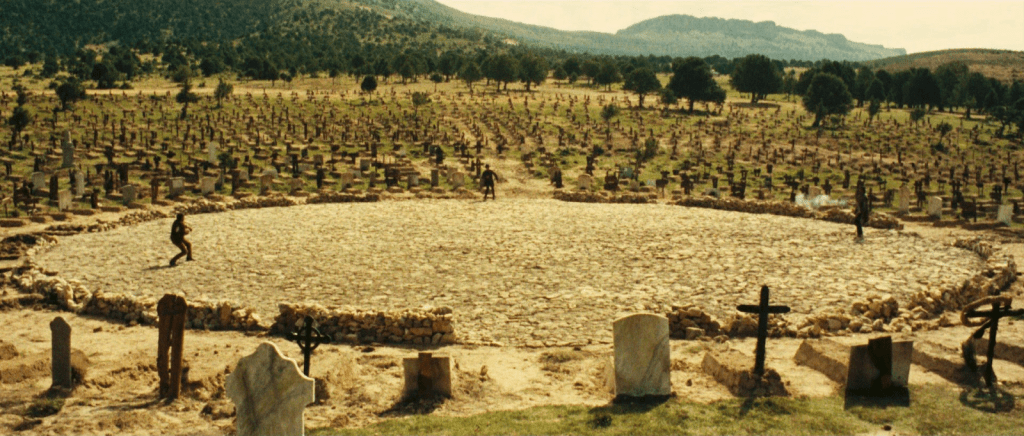
Demon Slayer: Mugen Train (2020) – 9/10✨~ “It is the duty of the strong to protect the weak.” ~ What a beautiful way of looking at the world 😭

Planet of the Apes (1968) – 10/10✨~ “Take your stinking paws off me, you damned dirty ape!” ~ Stellar sci-fi horror with a transcendent leading Man in Heston. An eerie look into a twilight future, a film that will make you think and smile and despair all at once. The far future rise of the apes and the apocalypse of Man on Earth make for bleakly ill-defined musings upon present pitfalls. Proverbial ‘Last Man’ Taylor is the perfect representation of the human species, as we know them / as the ruling class apes fear them / as the underclass apes aspire to understand them — smart, dangerous, cavalier, relentless. Drifting through the cosmos, in firm command of his hypersleep crew and interstellar machines – Taylor’s ego is “squashed”, his words honied and profound; naked in the brush and on the run from an alien foe – he is methodical yet feral, patient with perforce manipulation and potential murder. He is the paragon “glorious paradox” that alights the 1960s hope for a true Space Age with his competent yet cynical command, still making war and still on the run from facing Himself. Taylor faces his pair of destinies with that time-honored duality: one with stoic, even eager, embrace {that of being alone and stranded in a faraway land}, and the other, his truer fate, with hysterical, useless lamentation. ~ “You Maniacs! You blew it up! Ah, damn you! God damn you all to hell!”

The Way of the Dragon (1972) – 9/10✨~ “It doesn’t matter what style if you can use your body well even in the midst of violent movement to honestly express oneself.” ~ A jump into Bruce Lee’s mindscape. Lee directed *and* wrote the screenplay of this action story himself, centering his starring role foremost from his lived experience as a Chinese American traveling abroad in modern day. The plot has Tang Lung as a stranger in a strange land, in Europe, caught between the Americans’ interests, and his own countrymen’s disparate plights and betrayals. He becomes the defender of the working man, and opponent to the owners and their hired {70s-mustachioed} goons. An artful sense of patience to the action, the comedy, and the scenery permeates throughout. The kitten watching Lee and Norris flex and warm up in pleasant silence before their bout, then later enthralled in deathly anticipation. The wide shots of Rome, the streets and the ruins. The perfect focus and confidence within every close up of our hero. Lee carried a precise vision for the beauty and flow of movement, in the fights, in his body, in his persona. It shines in every scene he’s in. What a talent.

The Godfather: Part II (1974) – 10/10✨ ~ “If anything in this life is certain, if history has taught us anything, it’s that you can kill anyone.” ~ The ultimate American Dream story: enterprising immigrant orphan coming from nothing builds multi-generational empire of power and wealth in New York City via CRIME. The midway of Michael Corleone’s hero’s journey parallels the true origins of his father Vito’s, starting from the shore of Ellis Island, 1901. ~ In the rise of his og godfatherhood, Vito uses love instead of strictly fear to win the hearts and minds of the community, enough to build his family’s ‘enterprise’ from the ground floor and on up. Meanwhile, Michael continues his evolution as the next gen Don, waging a shadow war to protect his interests with stone-cold gaze, his soul already sold, Death an intimate acquaintance within his rulership. Killing and loving with less than equal force, he wins the war but loses his family, gains the world but loses his. Vito’s integrity is inherited by Michael, but cannot survive the accelerations of modernity or the pathologies of power. ~ Ultimately, a story about family, their complex hierarchies and relationships, and what things – bloody and beyond good and evil – must be done for the sake of them. In our world, they will inevitably break our heart, either in what they do to us or in what we have to do for them. Vito and Michael are duplicitous killers. But they love their families. They may lose them, their souls, but not for want of trying to secure them a future. They are the gods of the underworld, and they are the heroes of America: Underclassers that made it over, nobodies that became somebodies, by any means necessary. / Transcendent performances from De Niro and Pacino, their stories well-woven together, fading into each other like wayward rhymes in a song. Every scene stays precise and realized, as though it is being stripped from the Real of another universe. You gotta love these films! I mark Part two as better than the first.

One Flew Over the Cuckoo’s Nest (1975) – 8/10 ~ This one will make you 🙁😄😧😭
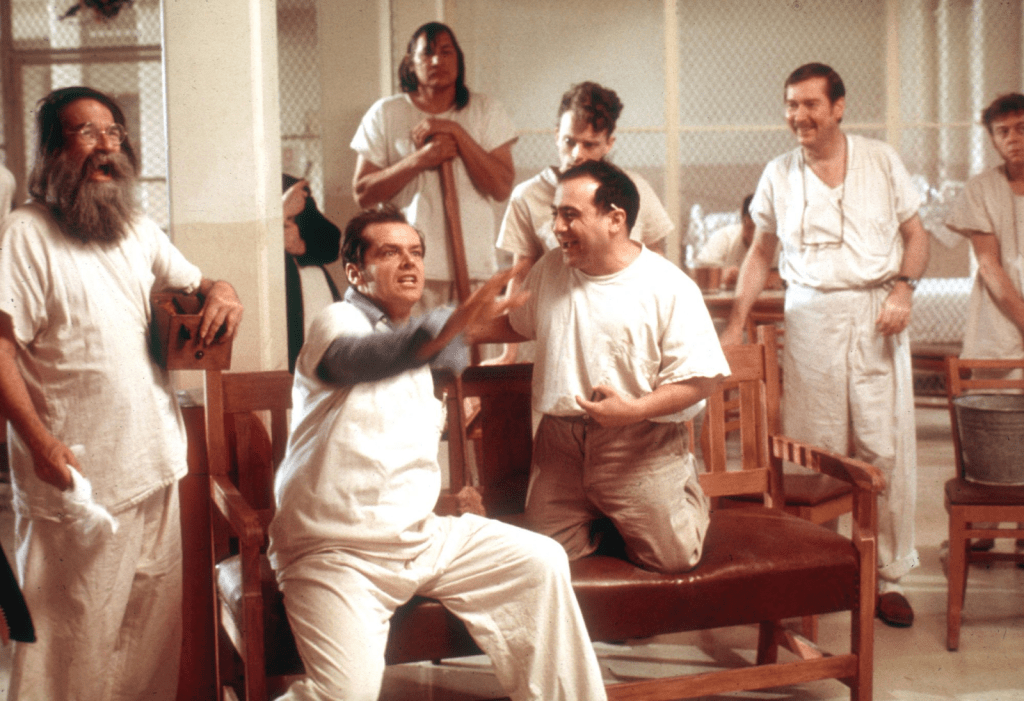
The Wailing (2016) – 8/10 ~ “Not everything that moves, breathes, and talks is alive.” ~ Chaotic, convoluted and brutal horror tale in rural Korea. Sharp cinematography crafts a world of constant and escalating terror, through the trees and under the thresholds, consistently rain-soaked. Bloody evils to be feared are birthed in the woods and gratuitously brought into a small village in scores – red-eyed zombies, nightmares and visions of the damned, a frightfully possessed child, a multitude of mass murders. The confusion, terror and maddening rage from the characters is palpably transferred to the audience: Who is the demon? Where do I put my faith? “Why on Earth is God letting this happen?” Is there any escape from this hellish spiral…? A jarring audiovisual experience from beginning to end. Ultimately, an ambiguous journey, it paints on a canvas of many culminating horrors and spiritual symbols wherein the audience can plant their own guessing visions at the nature of evil and the possibility of goodness in a demon-infested world.
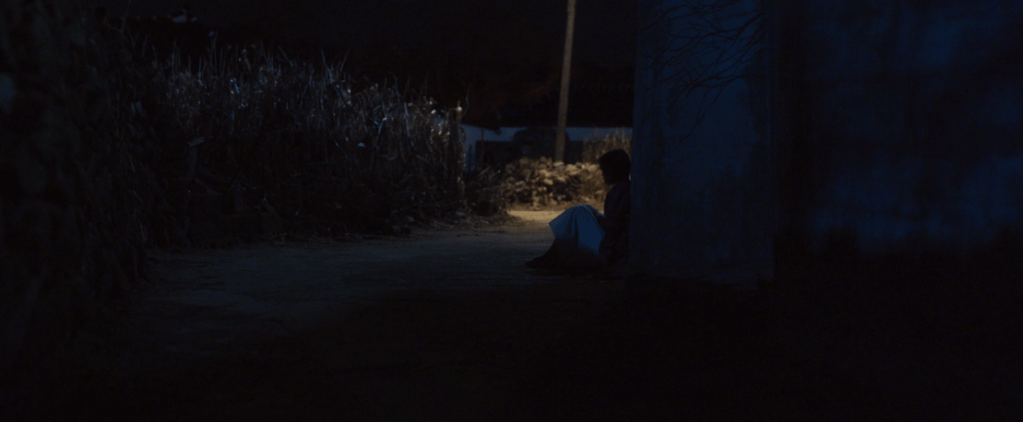
The Deer Hunter (1978) – 9/10 ~ “A deer has to be taken with one shot.” ~ War, war changes everything. High art allegory about The Vietnam War as a brutalizing psychosis, pulsing its horrors into every American town through the roots, from out of the heads of her eager boy soldiers. Believably depicts the mid-20th working class as a cohesive unit, an ecosystem of light-hearted, deep-seated Americana. {Offset by the unbelievable sadism and wickedness from the Vietnamese captors, a righteous criticism of the film.} Due to their constant proximity and the social structure of cities like Pittsburgh, they truly lived like a community. Factory, bar, church. Altogether, every person known and looked after, dysfunctionally loved as family, one way or another. *Before* the war. / After it, with long absence and unspoken atrocity, the “warriors” from an unworthy war, formerly community leaders in peacetime, do not return. They can never be the same. And neither will the community. Death, repression and tragedy claim these central personas, now near or far, and the rot grows outward. The Deer Hunter shows Russian Roulette isn’t a game of chance, not really. The playing of it, through many pulls of nihilistic savagery, certifies a singular outcome. Not every chamber need house a bullet to do the absolute work of killing a mind.
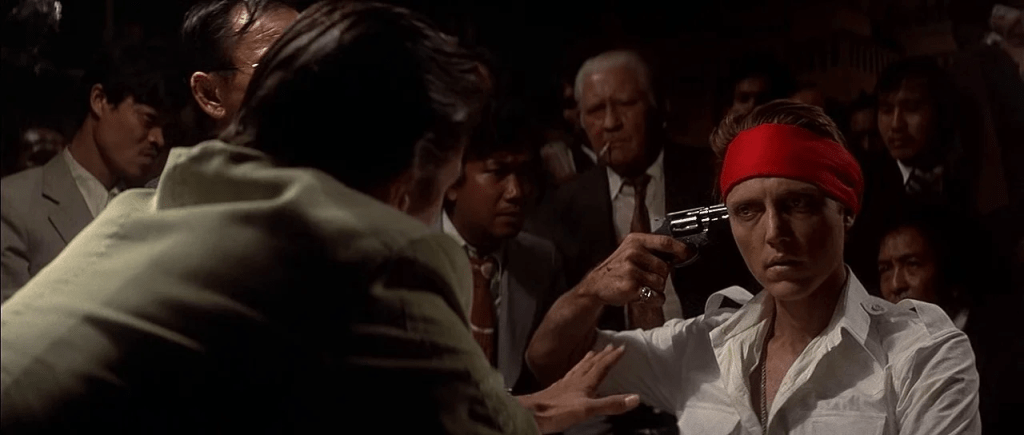
Drunken Master (1978) – 9/10✨~ “Don’t be fooled by my staggering around. There’s power inside to kill. It looks real enough, yet it isn’t. The fact that you’re pretending to lose lets you win. … Drink down the wine! A sober man and the sages are both lost through the ages.” ~ A highly entertaining kung fu dance. The expert choreography produces combat comedy effortlessly. {On the screen, for us – not so easily for the wildly talented Chan and Yuen.} Chan’s signature of complex environmental violence on full display, every bout is a tangle of leaping and falling strikes, punches, kicks, wacky, dancing exertions from every angle. And there are many, many bouts. What is better than fighting and drinking? Drinking *while* fighting! Artful and magical physical cinema. Nothing beats real stunts. Among the best kung fu I have yet seen.

Escape from New York (1981) – 8/10 ~ “Get a new President.” ~ Dark action cinema. The pulsing, Carpenterian score atmospheres the imagery of a ruined NYC, a prison realm of constant fires and demonic raiders, our former jewel of the empire now under eternal night. Awesome! Kurt Russell as Snake Plissken is the ultimate anti-hero. A war vet that doesn’t give a shit about his country’s war or its president, justifiably so, who heisted the Federal Reserve itself to earn him his life sentence in his fallen country’s self-constructed neo-Hades. He does the job, but only for his freedom. And not all the way. Gotta love that walk-off. F*ck you, Mr. President. Van Cleef’s performance as the grizzled overseer is also top notch. {also thank you John Carpenter and Kurt Russell for Metal Gear 🙏}

Raging Bull (1980) – 9/10 ~ “How much can ya take?” ~ Raging Bull: Throwing punches in the ring, taking punches at home. De Niro in an all-time role. “You never got me down.” is one of the best moments in cinematic history.

First Blood (1982) – 10/10✨~ “When in doubt, kill.” ~ A concise, near perfect film. Action-packed and laced with more meaning than you may realize. Well-paced, well-shot. An intriguing premise, realistically plotted as far as the responses of the parties involved, in America. And in the end, a tragic film because of that fact. – https://letterboxd.com/zsoro/film/first-blood/
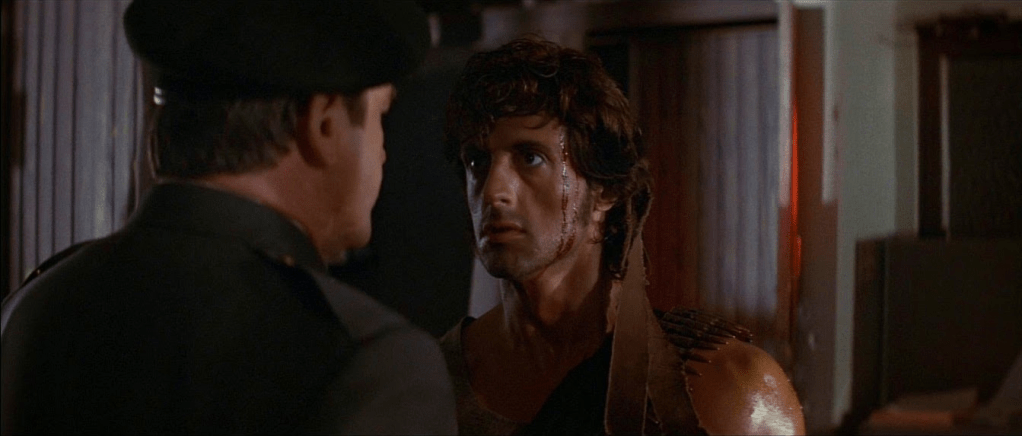
Pink Floyd: The Wall (1982) – 7/10 ~ “Tear down the wall!” ~ Mind shattering audiovisual phenomena. How do we build up our walls of stone and flesh? and how do we break them down? Can we? In the meantime, what do those walls transform us into? An album + film that is an artful depiction of repression and insanity. Pink Floyd is one of the best bands to ever do it.

The Terminator (1984) (rewatch) – 10/10✨ ~ “You go naked.” ~ Action sci-fi techno-horror. The best. Future terrors of Artificial Intelligence arriving today in the form of an unfeeling and indestructible hulk programmed to do one thing perfectly well. Arnold is the mythic Golem, but designed without error and sent through time to ravage an unprepared world. The concise, perfectly looped plot pits man vs. machine; Reese, the human, like his cybernetic foe is similarly programmed for constant warfare by the dystopia he was born into. But he fights for something beyond himself, for love. And through he and Sarah Connor’s death-defying travails against the Terminator, the exact future Skynet works to prevent is born. Top notch cinema. Next to the xenomorph and Michael Myers, the Terminator has got to be the best, most relentlessly terrifying cinema villain ever.

The Quiet Earth (1985) – 8/10 ~ Rapture fantasy. Except the Earth is left merely quiet and not in hellfire. Which is worse. ~ “I’ve been condemned to live.”

Stand by Me (1986) – 8/10 ~ “Bullshit! / Bulltrue!” ~ Childhood as an unforgettable adventure that we can’t get back, truly cherished {or cursed} only in retrospect. Death faced too soon surfaces unapproached trauma, shatters innocence, widens the world. And even so, those feelings are nameless and inexpressible. To deal in them, you just need someone… standing by you.

The Color of Money (1986) – 9/10 ~ “Hey. I’m back.” ~ Do you play for the money or for the game? Big league cinema. Newman electrifies every scene he’s in, with low tones, fast words, steady looks, streams of confidence man witticisms, the works. Fast Eddie makes pool the hypest sh*t ever.

The Running Man (1987) – 8/10 ~ “We give ‘em what they want!” ~ In a totalitarian future where police officers who refuse to murder for the state are sent to concentration camps then turned into live-televised global battle royale contestants, Arnold fights for survival and runs into revolution. Hell yeah. Instant classic.
Based on a supremely underrated Stephen King novel. Superficial working class politics encapsulated in a gaudy dystopia with absurd and goofy action adventure. Arnold and the gang fight against some anime-ass villains. Every one-liner is worse than the last. Top notch 1980s cinema. Heavily altered from its source material but just as awesome imo.
Death as entertainment in the 21st century, TV as a glut of snuff game shows for an emotionally invested, cheering, imprisoned audience consumed by its distracting glow, hounding for blood to flow. Are we not on our way? / Can’t wait!
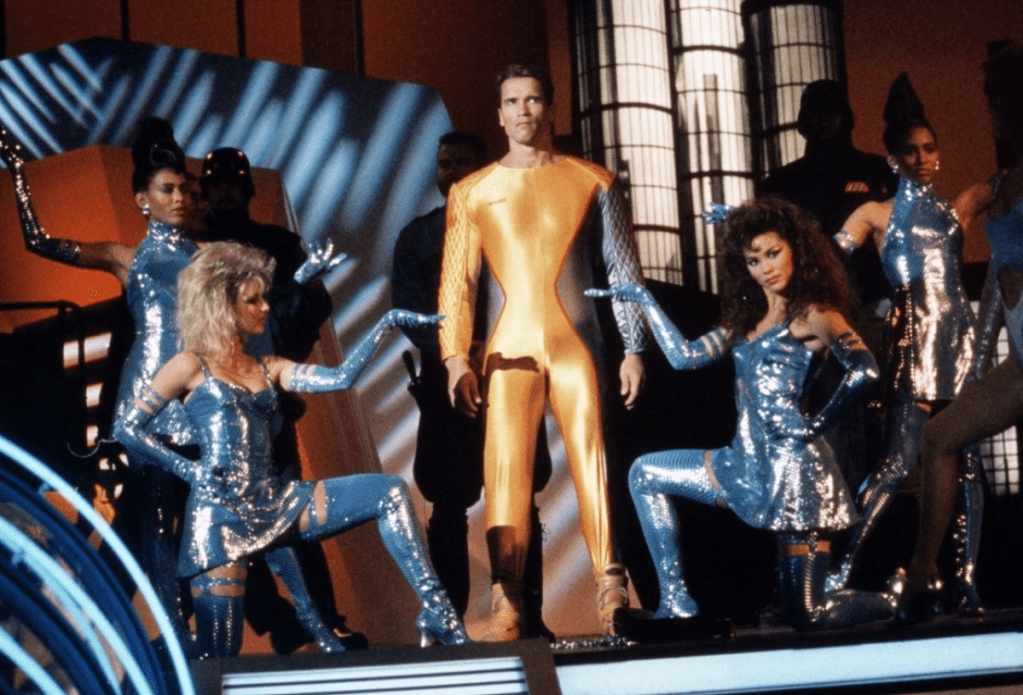
RoboCop (1987) – 8/10 ~ “Dead or alive, you’re coming with me!” ~ Robocop, Police Golem, an agent of privatized, programmed state violence, a tool of corruption. And comedy. The extended mag hyperviolence is instant hilarity. Big mech defeated by stairs. Exploding mutant man. LOL. The tragedy of Weller’s everyman cop and his lost family falls away with the inspiring music to score the drug den massacres. Rough and tumble cops are overmatched by the cackling criminals who kill for fun, all of them fighting for their lives in a fallen city in a degrading country. The soul suck of TV, forever war, environmental destruction, and three generations of executive negligence and evil fill out the hypernormalizing satire. In the end, there are no solutions to anything, only death-dealing vengeance. Good picture.

Grave of the Fireflies (1988) – 9/10 ~ War’s destruction and desperation through the innocent eyes of starving children, two more of its casualties. Shows how a whole society copes with and internalizes mass death. When there’s not enough to go around, when death is visiting so frequently, when every day brings sirens and horror – those at the bottom are effectively written off as already dead. Orphans don’t stand a chance. WWII brutalizes Japan, not only life but spirit. And yet, in the middle of the worst kinds of conditions, Seita and Setsuko manage to do *more* than cope. They are diligent and appreciative of every drop of life they get. The great heart wrenching tragedy of this film is seeing how full of life and spirit Setsuko is, for her short time. A great film, and I don’t think I can ever watch this again.

Metropolis (1927) – 10/10 ~ “Shift change!” ~ The materialism x spiritualism of class struggle depicted with silent personas, pulsing orchestrations, and expressive imagery. An allegory for the modern world, layered inside of visionary sci-fi, made 94 years ago and just as relevant today…
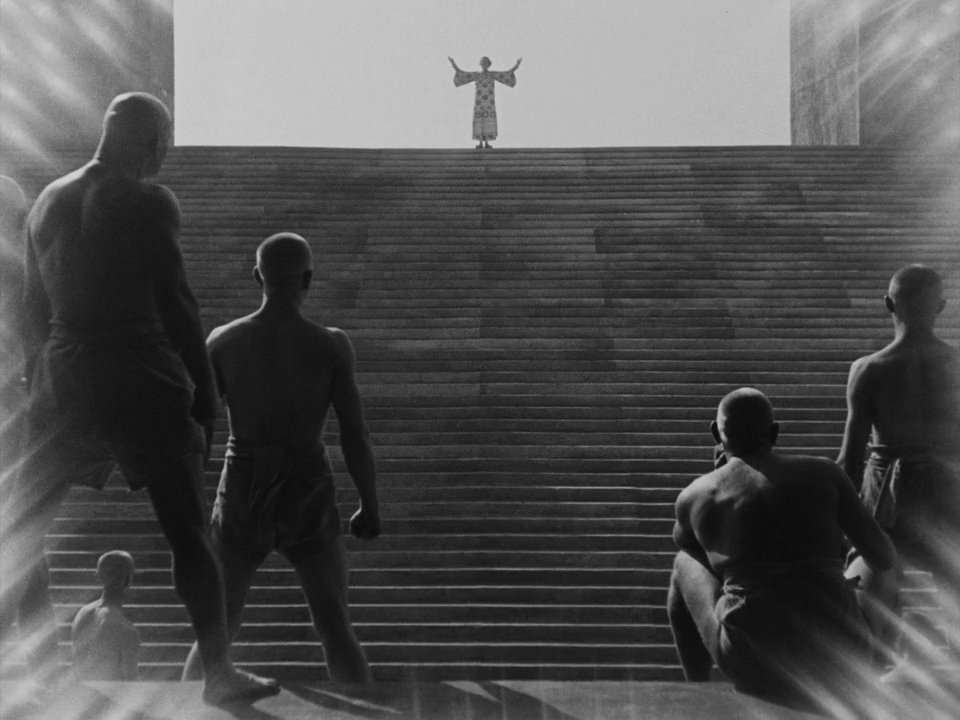
Do The Right Thing (1989) – 9/10 ~ “The story of life is this: static.” ~ Inventively filmed community sandbox. A masterpiece. Entertaining drama from start to finish with many messages on America. Love/hate, violence or words. Martin v. Malcolm. Tolerance/intolerance (i.e. the different gradations of modern racism). Impassioned dichotomies mark the interactions between races, generations, classes, storefronts in one zone inside the jewel of America, NYC. The people of Bedford-Stuyvesant meander in and out of each other’s lives, looking for money or trouble, self-expression or a way out. Maybe just a kind word. Mookie’s pressured yet charismatic courier role puts him at the center of the neighborhood’s flows and conflicts, where we get to see the interconnections first-hand. The black community tentatively coexists with Italian-Americans, Koreans, each other, always under the menacing eyes of the police ready to arrive at a moment’s notice. It’s “their” neighborhood, but where is their power, wealth and ownership? Everyone is throwing their energy down different avenues. Across race and class, the community elders toil and daydream while the young guns get angry and pick fights. Prime layers of action build around the neighborhood’s twin cores – pizza and music – with heartfelt animus, toward familiar tragedy. Where does the cycle end? What will dissipate that inner anger? When, at the end of the day, will the ones with the most *power* do the right thing?

The Godfather: Part III (1990) – 9/10 ~ “The only wealth in this world is children.” ~ The end of the trilogy. Michael Corleone trying to make peace. With his family, with God, with himself. But he lived too long by the sword, alive too long as an alpha among wolves ready to capitalize upon any show of weakness. Reprisals come to destroy peace. The worst of them arise within his own heart and mind, from the guilt of a past full of ruthless pathology. Pacino’s performance gives Michael a transcendent pathos. The finale gives you a lasting sound and image of the Corleone family’s path. And Michael always had “a whole different destiny planned…”

Rosencrantz & Guildenstern Are Dead (1990) (rewatch) – 8/10 ~ “We must be born with an intuition of mortality.” ~ Absurdist tragicomedy of a forgotten duo from Hamlet. Metafiction about *conscious* side characters in fiction, on NPC energy and life for some as a spectator sport. Existential questions of fate and death are traded by R and G, in between their minor lines in Hamlet’s ending days. Well written with solid performances from Roth and Oldman. ~ Rosencrantz & Guildenstern Are Dead – Thresholds of Transformation

Boyz ‘N The Hood (1991) – 10/10✨ ~ “Rick, it’s the Nineties. Can’t afford to be afraid of our own people anymore, man.” ~ A tragic passion play of friends, bullets, sex, fatherhood, history, life, death. The systemic conditions and the outside influences that create the “hood” are designed to imprison black men’s futures and drive them mad, into theft, murder, the American criminal *injustice* system. Idle time, drugs and alcohol, lack of educational opportunities, racist police hunters, rival gangs — the hood is a complex maze of traps, with unconsciousness, prison, or death always just around the block. A maelstrom of trauma awaits every family. The black community’s resilience amidst the violence, then or now, is to be admired – and more importantly, alleviated. This film captures all of it. Should be required viewing in school for every American.

JFK (1991) – 10/10✨ ~ “The Agency plays for keeps.” ~ A riveting investigative play into the JFK assassination, the “counter-myth” to the official fabrication, as director Oliver Stone proclaims it. So much going on, so many transcendent performances and messages and scenes. Throughout the journey, Costner’s Garrison lays it all out, from stem to stern, with much help from a few key witnesses, inside men, conspirators’ words and reactions both: *Telling the truth can be a scary thing sometimes.* / *Let justice be done though the heavens fall.* / *Back, and to the left…* – https://letterboxd.com/zsoro/film/jfk/

Terminator 2: Judgment Day (1991) (rewatch) – 10/10✨ ~ “The future is not set. There is no fate but what we make for ourselves.” ~ Action movie that absolutely rips and also manages to be mythic and heartfelt. And it’s a sequel to an already great film! Evolves the mythos and expands the scope of the future x past story. Arnold’s turn from *The Terminator* to non-lethal agent for humanity and father figure shows both the adaptation of a machine and his range in this role, as either terrifying heel or lovable face. Establishes Sarah Connor as one of the most badass characters in fiction and the T-1000’s liquid metal stylings as among the most inventive forms of villainy in cinematic history. Who doesn’t love Terminator 2? Also, that judgment day city and people annihilation scene is so f*cking brutal. Metal.

Deep Cover (1992) – 9/10✨ ~ “Being a cop was never this easy.” ~ Tightly paced, stylishly filmed. Furious and brutal noir with screen wipes. Fishburne carries the flow as the narrating keyman; Goldblum doing… discursive, barmy, felled Crimeblum. Lot of over-the-top performances from the side players. Ultimately a well-built yet campy yarn about police corruption and the viciousness of the ill-fated war on drugs and the brave new world of incestuous global narco-capitalism. Great ending. Great soundtrack. Great picture.

Before Sunrise (1995) – 9/10✨ ~ “I believe if there’s any kind of God it wouldn’t be in any of us, not you or me but just this little space in between.” ~ Two insanely intelligent babes talking to each other all night. A great film. Shot like real life, with bombastic and natural performances from the pair of leads. Reminded me of “My Dinner with Andre” but sexy and with movement and better. Also, Ethan Hawke essentially invents twitch in the beginning on the train, with his 24-hour public access TV channel idea.
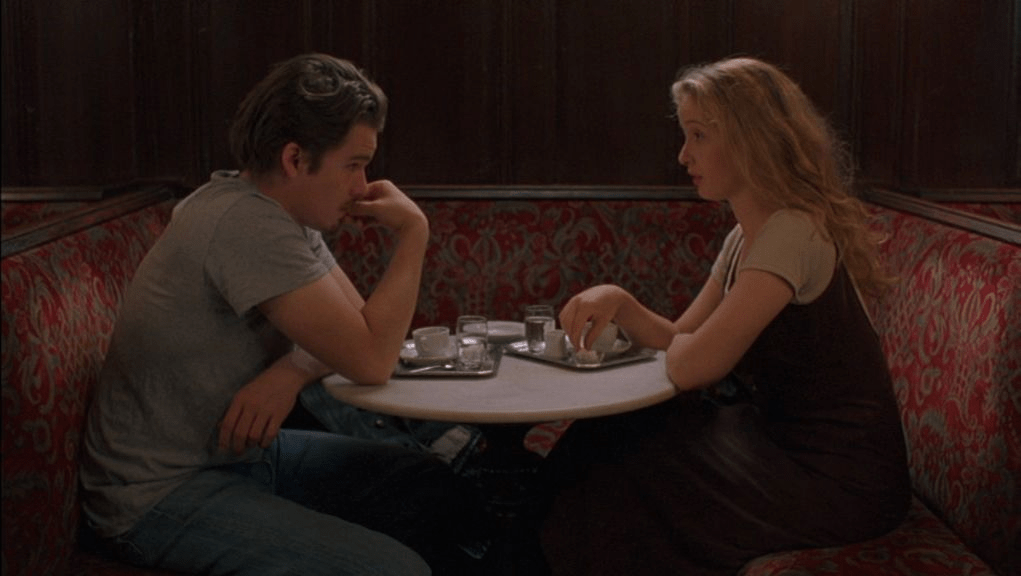
Johnny Mnemonic (1995) – 7/10 ~ “I need a way out. I want to get online… I need a computer!” ~ Keanu as an online-addicted g-man with Internet-poisoning, who traded corpo secrets for his childhood memories. JM gives us the mid-90s retrofitted prospect of logging onto the 21st-century super-Internet being a traumatic physical experience. What if we had to *earn* our strokes of cybermancy through mental sacrifice and bodily ordeal? Might then the Internet be seen with more fear, or grace? (certainly, we’d log on less!) The scenes of graphical VR computing through a digital landscape are a wonderful relic of the time’s CGI tech as well as their predictive, incorrect futurecraft. The Yakuza laser whip was freaking dope. Dolph Lundgren as a cyber-enhancement-addicted super-Catholic assassin? Yeah. Ice-T as part of a grimy, steampunk guerilla anarchist hacker collective with underground clout and sentient cyber-dolphins was rad. Ultimately a very anti-authoritarian and anti-capitalist sociopolitical movie with its core story beat: corporations will coverup cures to peddle treatments and they’ll use digital obfuscation and lethal force to do so, not because CEOs are evil but because corporations, as the prime nodes of capital, are designed to do just that.

Memories (1995) – 9/10 ~ “Memories… Memories aren’t an escape.” ~ Three intriguing and imaginative sci-fi x horror tales with human messages at their heart. Beautifully animated, with an amazing score and every attention to detail in visuals and scripting. “Magnetic Rose” posits the derelict ship x haunted house sci-fi yarn with character twists and the prospect of memories being as sentient as we are, ala being *ghosts* in and of themselves. “Stink Bomb” is a comedic horror piece about the failures and miscommunications within bureaucracy, namely in the science of war and the possibility that we end up destroying our own homes in trying to develop a weapon to destroy our ‘enemies.’ “Cannon Fodder” shows a society ritualistically-structured around a war that doesn’t exist, where everyone knows the score and goes through the motions – save for the children, who become true believers in the only fantasia offered to them and look forward to being the leaders to one day fire the cannons into the clouds and sand.

Millennium Actress (2001) – 9/10 ~ “Even the old people were once young.” ~ A non-linear tale, off-kilter yet full of heart. About the life of an elderly Japanese actress, who lived through the 20th century’s greatest upheavals all the while on a harrowing personal journey of her own. Loved the character of Genya. Another masterpiece from Satoshi Kon, RIP.

Primal Fear (1996) – 8/10 ~ “Why gamble with money when you can gamble with people’s lives?” ~ A taut legal thriller with top notch performances out of Gere, Finney and Norton. Terrible crimes uncovered by a gambiting lawyer with a heart of gold; psychosis presented as a defense mechanism against abuse. More layers than expected. Goes from good to great in the final act. Somebody bring back courtroom thrillers!
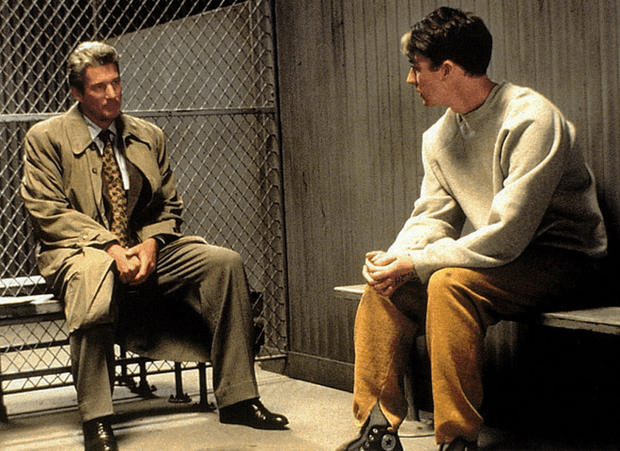
The Chungking Express (1994) – 9/10 ~ “Love you for 10,000 years.” ~ A melancholy noir tale about the desperation of modern loneliness. What are our routines and who are the people around us? Is romance still possible? About longing and lost love. People don’t even know what they want and then it might be too late anyway. Some frames straight up look like god-tier paintings. ~ “Can sleepwalking be contagious?”

The Devil’s Advocate (1997) – 8/10 ~ “I cared about what he wanted and I never judged him.” ~ An enthralling metaphysical play on the 90s courtroom thriller genre. Mixes between taut legal to creeping horror to a hangout movie. Extremely watchable yet builds to some very emotional climaxes. Keanu rises to the occasion while Pacino is firing on all cylinders. Incredible performance and ending out of the GOAT. We need more Pacino Satans.

Blade (1998) (rewatch) – 8/10 ~ “Some motherfuckers always trying to ice skate uphill.” ~ Blade is just the coolest dude. An action-packed gem, full of style and horror. Vamps as an underground parallel society ala Vampire: The Masquerade. (Wild to think that Spidey and Cap live in this same universe.) Blade is the classic man of two worlds. He seeks an impossible redemption in his forever counter-hunt. A fanged Batman with better weapons and a cooler car. The fear of the vampire is myriad: they feed on us, they can be anyone, and we need one of them to fight for us. Dorff’s Frost embodies the vamp supremacist. Fight scenes are transcendent. Snipes is absolutely perfectly cast. Phenomenal punch and kick style to watch. An iconic look, with many entrances and quotes to match it. Some truly inventive blood and gore that will make you scowl and laugh at the same time. Nothing special about the story but it’s fast and delivers a lot of good Blade-on-vamp violence. On a second look, one of the best “superhero” movies we have straight up.

The Talented Mr. Ripley (1999) – 9/10 ~ “Tom has nightmares.” ~ Movie about obsession and duality. No one gets off on his talent more than Tom Ripley; no one misunderstands his own actions worse than Tom Ripley. The con, on Other and Self, works because he mixes truth with the lies, sincerity within the performance. Ripley is a no-man, he has nothing to go back to. Of course he *means* every lie he tells. He’s in-between everything, escaping, lying to be able to get to truth. He’s a scoundrel and a hero because he’s a human being. He wants to be anything but himself. He doesn’t know who he is. And he uses up other people on the way to self-discovery. In the end, he wants to survive more than he wants to tell the truth. Tom’s monstrosity and humanity mingle with his guilt and lack of guilt, his passions and reasons, his love of the subjects that he kills. Tom is trapped, Tom will never be caught.

Dune (1984) – 8/10 ~ “Father! The sleeper has awakened!” ~ A melodramatic yet satisfying adaptation of the 1965 sci-fi epic. The noir inner monologue voiceovers bring together the mental narrative to match the somewhat rushed pace of the years-long story. The Atreides’ nobleness and the Harkonnen brutality strike a stark contrast, each under and over-acted well enough by a strong cast. The familial opera eventually brings on the worms and big FX as the saga escalates to its endgame. The hero’s journey goes sicko mode on the deserts of Arrakis, where personal transformation morphs into revolution and then drug-fueled interstellar Jihad.

Dune (2021) – 9/10 ~ “Dreams make good stories, but everything important happens when we’re awake.” ~ A monumental vision of classic sci-fi. Grand vistas of sound and landscape and BIG WORMS. Visually as satisfying of a film as I’ve seen, especially for those familiar with the material. Denis’ adaptation of the royal drama clashing geopolitics with psychology and ecology and mysticism is as faithful as it could theoretically be. Enjoyed Momoa’s Idaho and Ferguson’s Lady Jessica most of all. Best worms in cinema, hands down.

Another Round (2020) – 9/10 ~ “Have I become boring?” ~ What a movie! A tale about a man returning to life. An alcoholic experiment magnifies the fading fire, burning an urgency into the mix of four men’s tedious lives — while it also makes them reckless, forgetful, obnoxious. All things that being drunk can and will do, happen. It is a transformative substance, for better or worse. For the characters, in the chaos and emotions come clarity on what is important in life. Words are spoken, actions are taken. Joys and regrets are created. A man is dancing once again, a former passion lost in life’s buildup of travails. And none of it would have happened without an altered state of being. Endearing performance from Mads as a man who has lost his spark, who we get to see gain it back. Mads dance in the final scene is one of the best things I’ve ever seen in cinema.

Waking Life (2001) – 9/10 ~ ”As the pattern gets more intricate and subtle, being swept along is no longer enough.” ~ A dream of a movie, full of philosophical exposition and drawn out realizations about life, choice and meaning. A picture for me. Impossible to understand everything it’s about in one go and you have to be in the mood, but it’s artful cinema no doubt about it.

Tombstone (1993) – 10/10 ~ “Oh make no mistake. It’s not revenge he’s after. It’s a reckonin’…” ~ Who doesn’t love Wyatt and Doc? A heroic Western tale about guns and blood, brotherhood and the savage necessities of a harsh world still being born. Killers stride over the land *looking.* For an escape, or their very souls. For life itself. In a lawless land, the only true morals are bullets and history is written by the last man standing. With matters of art, and of the heart, Faust and Chopin and the lovely dame cannot reach them all, not past the surge of strength a revolver gives a man. Dudes rock the reckonin’
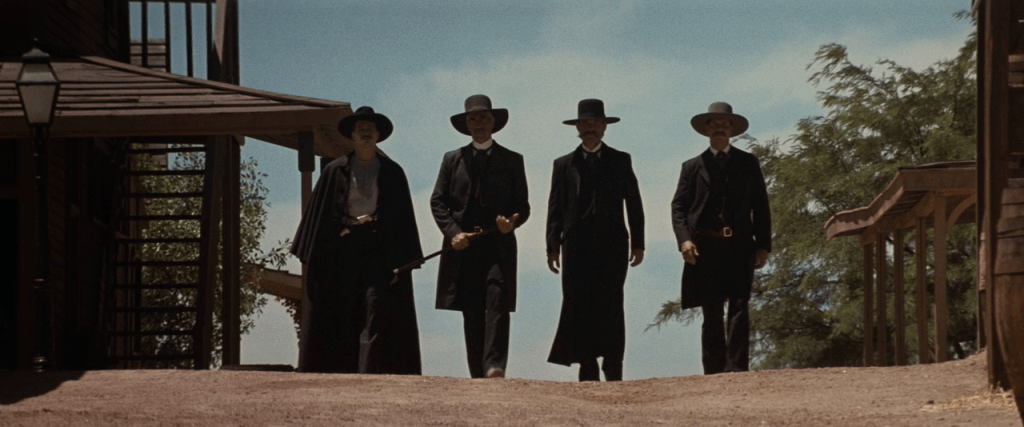
Spider-Man (2002) – 8/10 ~ “Because you feel stronger and weaker at the same time…” ~ An adventure tale about love and courage and power. Spidey and Goblin are the manifestations of human good and evil. Parker and Osborn’s ego and id duel for control of the newfound abilities they wield. Dafoe’s daemonic performance is GOAT’ed. Great music, pacing, storytelling. A simply enjoyable picture. Peter and MJ’s fraught love story begins, with alter ego Spidey’s swag as the heart of his heroics and romance.

Spider-Man 2 (2004) – 8/10 ~ “It’s wrong to only be half-alive.” ~ A story about a man driven mad by his own ambitions, by the mere sight of power. Like every Spidey villain, Otto Ocktavius wants to build a better life, a better world – but at the cost of potentially destroying it, and himself, in the process. Spidey 2 is all about identity, about the soul of the choice of who we are. You can’t do anything without committing to it; but going all in could mean losing everything, even yourself. *Dark night of the soul* ish for Spidey and MJ both.

Spider-Man 3 (2006) – 8/10 ~ “It’s the choices that make us who we are.” ~ The culmination of Peter and MJ’s love story, the Osborn dynasty’s revenge x redemption, more tragic villainy from men on the edge. Spider-Man 3 is cool because we get to see vengeance, and shadow goop, and a guy get turned into sand. … Raimi’s trilogy are all part-time monster movies. Observe horrifying transformation scenes, purposeful madness, tragic ironies forging perfect foils to Spider-Man’s richly chaotic arc. Goblin. Doc. Goblin Jr. Sandman. Venom. / Pressure. Discovery. Revenge. Desperation. Hopelessness. Spider-Man’s villains are the best because they are all people, made by choices borne out of some kind of flawed love. … a healing ending for our boy Peter and girl Mary Jane.
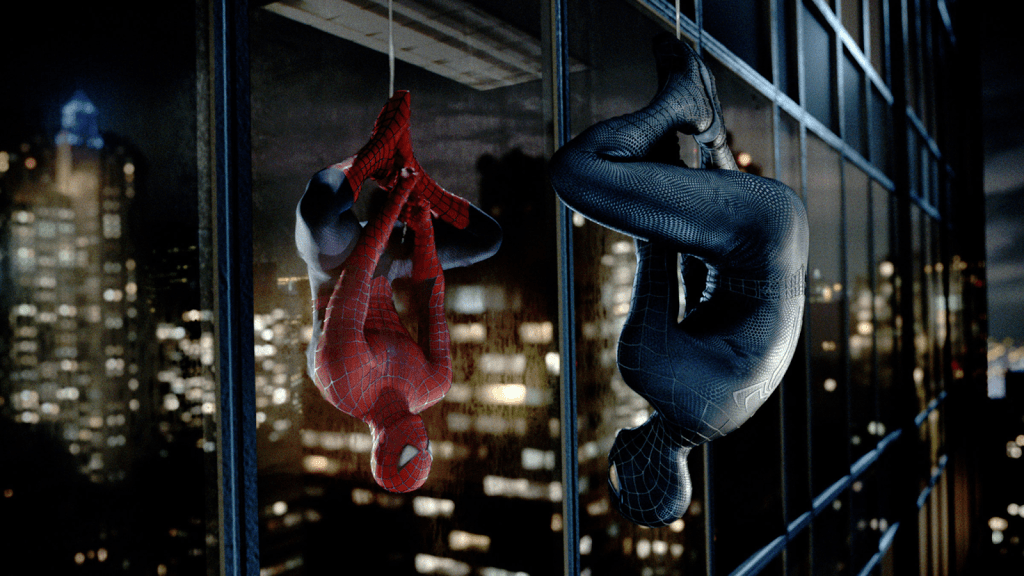
Spider-Man: Homecoming (2017) – 8/10 ~ “Can’t you just be a friendly neighborhood Spider-Man?” ~ A more down-to-earth MCU flick that wraps a yung Spidey into the ongoing worldbuild. Holland is a good match for the character. Charisma meets smarts meets heart. Loved Keaton’s Vulture as the working class alien tech scavenger with a justifiable villainy in a mad world. Stark goes from playing father to becoming one. Parker grows up – and grows out of his competition between being Peter vs. Spider-Man. Balance always leads to MJ, and vice versa. And Zendaya is a tsundere! Thoroughly enjoying the Holland pictures.

Spider-Man: Far From Home (2019) – 8/10 ~ “People need to believe. And nowadays, they’ll believe anything.” ~ Spidey vs. Mysterio in a convoluted plot of intrigue and betrayal and layers of necessary MCU interconnections. Parker goes from jumping at heroics to yearning for the normalcy of a young romance. Gyllenhaal’s Quentin Back is excitingly unstable, but only when you look beyond the surface of the glass. Most impressive aspect of this film might be the fact that they made the fishbowl work. Nick Fury replaces Stark as the anchor to the larger story; the terror of flying gun drones, false narratives, trusting good-looking white men make up the major themes. Peter and MJ’s awkward zoomer romance should make you smile. We live to see Spidey go through it, and this one, the previous one, and the next one all supply it in spades. Wonder what constantly sacrificing, trustless, MJ-loving Peter will do when his identity is revealed to the world? Definitely nothing impulsive and short-sighted and multiverse-compromising…

First Reformed (2017) – 8/10 ~ “Courage is the solution to despair, reason provides no answers.” ~ A role built for Ethan Hawke – a metaphysically curious x despairing Christian priest who turns into a potential eco-terrorist. From a man who lost it all, purpose comes in defiance against a world that doesn’t care what it destroys. Starting with the environment, ending with the psyches of some of those paying close enough attention. With repeated, spoken aloud questions like “Will God forgive us?”, it’s a very serious and somewhat devastating film, until the very end. The finale is pure cinema.
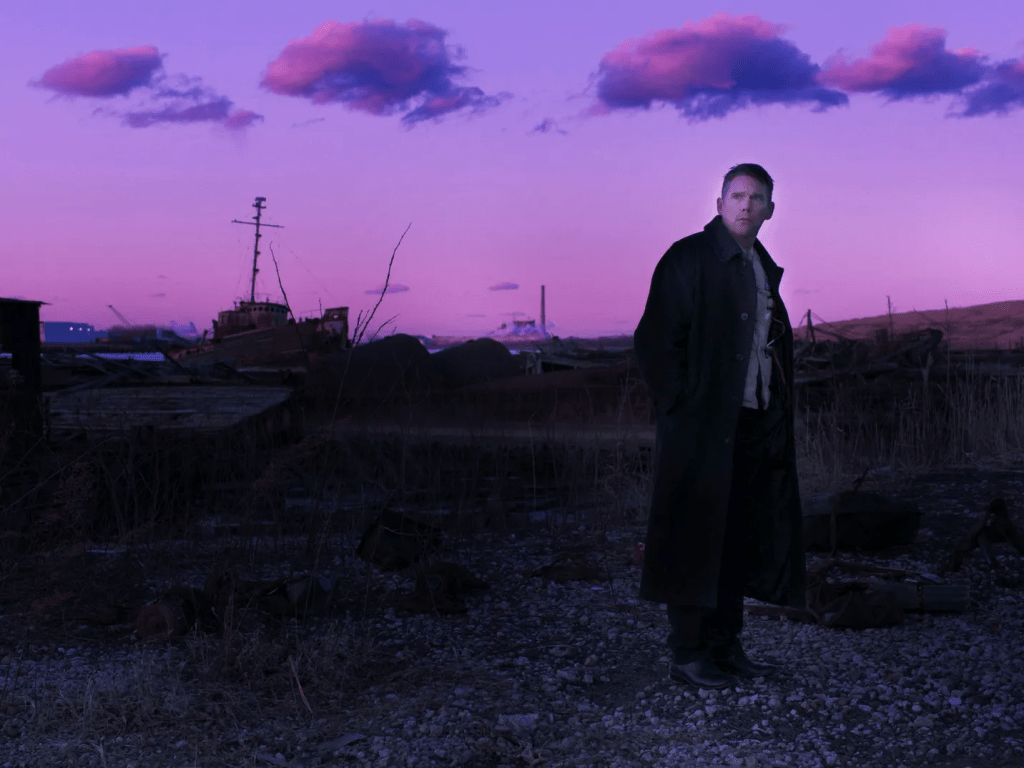
Benedetta (2021) – 7/10 ~ “The ways of God are often terrifying.” ~ On the repression of religion and the politics of miracles. Disbelief in them is prudent but disloyal to the very concept of faith. Sex is anathema for a nun – but what if it’s the key to communication with God? Why not have divine connection source from consensual love-making when all the men at the top of the church so often speak with a false authority founded upon rape, abuse, torture… Benedetta is an iconoclast in the Catholic church, challenging taboos as only a woman might. She is so — not just for fucking and lying, or maneuvering via miracle — but for advancing with a powerful, fearless grace toward her forbidden desires, with a real belief in Mary, Jesus, God, Paradise. Also, the nuns were hot.
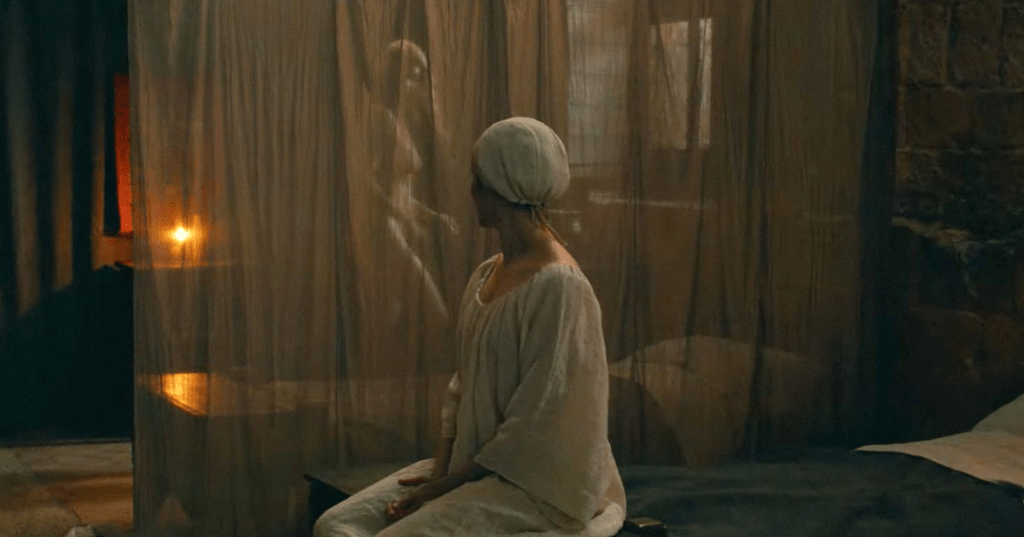
Spider-Man: Into the Spider-Verse (2018) – 10/10 ~ “You’re the best of us Miles. You’re on your way. Keep going.” ~ A perfect film. For Spider-Man, for fantasy storytelling, for the inventiveness of animation x music x presentation x character building. It’s got it all. Every emotion is played on as we watch Miles Morales become Spider-Man. Not the one and only — but one among the many. Miles’ run as Spider-Man makes him imperative to the mythos because he shows how there isn’t just one Spidey. It’s not just Peter Parker. It’s Miles, Gwen, Pennie, Peter B. Perfectly aligning with the hopeful spirit of the character, *anyone* could be. (Including you.) Spider-Man isn’t a singularly special person — they are an ideal, a heroic dream. And while we cannot choose our powers (our circumstances), anyone can *choose* to be Spider-Man. That’s the multiversal song of the Spider-Verse, full of lyrics worth listening to, now more than ever.
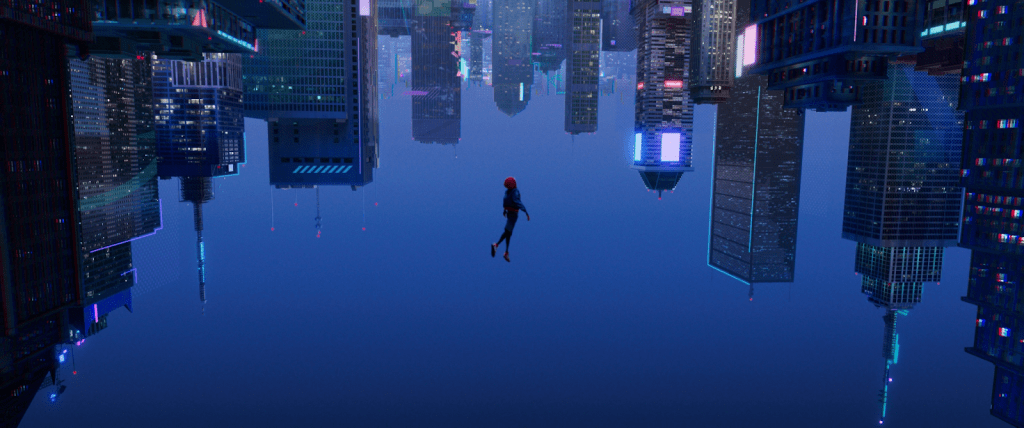
Spider-Man: No Way Home (2021) – 9/10 ~ “Peter, you’re struggling to have everything you want while the world tries to make you choose.” ~ Multiversal Spidey action between a cadre of villains and a trio of Peter’s. The core of the story is all about Peter trying to have his cake and eat it too — wants to be Spider-Man + normal life with MJ & Ned + save all his villains from other dimensions without having to fight or kill them… The magic-based plot, set up by Quentin Beck’s reveal of Peter Parker’s true identity, gives us a satisfying reason to see Holland’s Spidey bounce up against the whole history of the character from 2002-present. (Spider-Man vs. Doctor Strange is an all-time MCU 1v1!) End of day, the reprisals by the actors from McGuire’s 2000s trilogy and Garfield’s 2012-2014 double feature are the triumph of this movie. Seeing three Spider-Men co-commiserate and team up to *save* their collective villains is just about as perfect of a plot you could dream up for this character. And the villains don’t slouch. Molina’s Doc Ock and Foxx’s Electro were great — but tha god Dafoe’s Green Goblin absolutely steals the show. His demonic, two-faced turn as both mentally ill old + mythic symbol of supernatural evil (Spider-Man’s greatest foe) makes him the best part. Loved every scene he’s in. And GG is an imperative force for the growth of this MCU Spidey (May😭 x Garf saving MJ 😭😭). We finally get to see our Peter grow up and make the hero choice / sacrifice for the greater good, transcending himself in every way. Trilogy ultimately felt like one long origin – tied into mid-MCU phases as best they could – for a more classic iteration of Spidey: alone, paying rent on a bad NYC apartment, self-sufficiently fighting the good fight alongside so many personal and professional complications now past. Arc began with a call from Stark to pick sides in the civil war > proceeded into the infinity war against a universe-shaking threat > ends with a friendly neighborhood redux into an uncertain and melancholy future. Peter Parker, like his meta-predecessors, is now a superhero fit for the mask he wears: damaged but hopeful, powerful & responsible — even amidst the tragedy. After all, Spider-Man never gives up. ~ “This is what we do.”

The Matrix (1999) – 10/10 ~ “Welcome to the desert of the Real.” ~ The ultimate movie. The alienating unreality we feel in the digital age is given coherence via perfect philosophical action cinema. As much a love story as anything else. Trinity, Neo and Morpheus are a fated trio set to bring humanity out of its enslavement to the machines. Full of great performances amid the breakthrough concepting, especially Fishburne and Weaving. Creativity, belief, *love* are what separates us from the AI creatures borne from our computers. Oh and Keanu x Moss 😍

The Matrix Reloaded (2003) – 8/10 ~ “Causality. We cannot escape from it.” ~ Reloaded is about purpose and providence, causality …and kung fu. As a sequel to a tightly paced, nigh perfect movie, it expands the lore and the action stakes — and the love story started in The Matrix. The conflict between man and machine continues, but complicated by rogue programs and the prospects of Neo’s abilities. The 2nd GOAT’ed Trinity prologue, the Neo v many Agent Smiths, the highway scene, Morpheus’ sword work, Neo’s supersonic flights — all high art. Same with the music. The philosophical convos with the oracle, keymaker and architect — all sentient machines — brings to mind questions of predetermination. How *in control* are we as conscious beings? In the matrix or out of it, as code or flesh? Is understanding fate all we can hope to do, not change it? Idk … but Keanu, Moss, and Fishburne fight (and f*ck) like beautiful devils.

The Animatrix (2003) – 8/10 ~ “Your flesh is a relic.” ~ A great animated foray into The Matrix Universe. Extends the lore in a number of directions – backward, forward, sideways. Shows the edges of the matrix and the war on the outside in new light, educating viewers on the rules and possibilities of this world — people (like top athletes) can escape through great physical and mental exertion, bored and enterprising young kids will find the glitches in the system and play with them to make their own fun, other ships invented exciting ways to train and contribute to humanity’s war effort (create blind crisis simulations for their warrior crews and *turn* captured machines to their cause via psychedelic dream sex imagery). Perhaps most importantly, this film full of beautiful animation and voice work and music shows how the machine’s eventual defeat of humanity all began with our own corruption, vanity, hubris, and – most ironically of all – our inhumanity toward the first sentient machines. … Connects to the sequel films by showing how the kid Neo “saved” escaped through self substantiation, and how Zion was warned of the machine’s drilling attack. These interconnections, in addition to the well-written intrigues of the anthology mini-films in and of themselves, make Animatrix required viewing for any discerning fan of the saga.

The Matrix Revolutions (2003) – 7/10 ~ “I do know that as long as there is a single breath in his body, he will not give up.” ~ The heroic journey ends with the war for Zion’s survival and Neo going Jesus-mode. More in the grime of the real world, and out of the Matrix; def the worse in the series for it, but also provides a satisfying conclusion imo. The ending anime-ass fight in the rain between Neo and Smith for it all is worth the price of admission alone. Finale shows Matrix was a story about choice and belief — something that humanity and machinery oddly come to share.

The Matrix Resurrections (2021) – 8/10 ~ The Matrix returns as a mecha-genjutsu anchored by a resurrected Neo and Trinity, built not upon their consummated love — but upon their respective alienation, silent desperation, *yearning.*

SERIES
Requiem for the American Dream (2015) (documentary) – 10/10 ✨ ~ “What matters is the countless small deeds of unknown people who lay the basis for the significant events that enter history. They’re the ones who have done things in the past. They’re the ones that will have to do things in the future.” ~ Howard Zinn
^ That’s us, folks.

KolloK 1991 (2019-present) (RPG series) – 8/10 ~ A strange and surreal liveplay improv RPG experience by HyperRPG. Influenced by Twin Peaks, X-Files and all manner of supernatural mystery noir, the show is full of emotional force and psychedelic surprises – driven by both the actors/characters and the all-or-nothing die rolls..

Attack on Titan (2020-2021) (S4) (anime) – 10/10✨ ~ Entering Marley, we finally witness the other side of the Titan conflict. A whole world exists outside of Eren, Armin, Mikasa and the walls, on the other side of the sea. Introduced to a whole new cast, Falco and Gabi, with a damned and darkened Reiner, painfully awaiting the carnage to come…{I am pretty sure I know how this story is going to end. Look forward to the bloody saga to get there!}. God, the music.

The Promised Neverland (2019-2021) (S1+S2) (anime) – 9/10 ~ A thrilling mystery adventure show. Smart kids in a terrifying walled garden trying to outwit their strange world. Top notch animation and cinematography; compelling characters and well-crafted cliffhangers throughout.
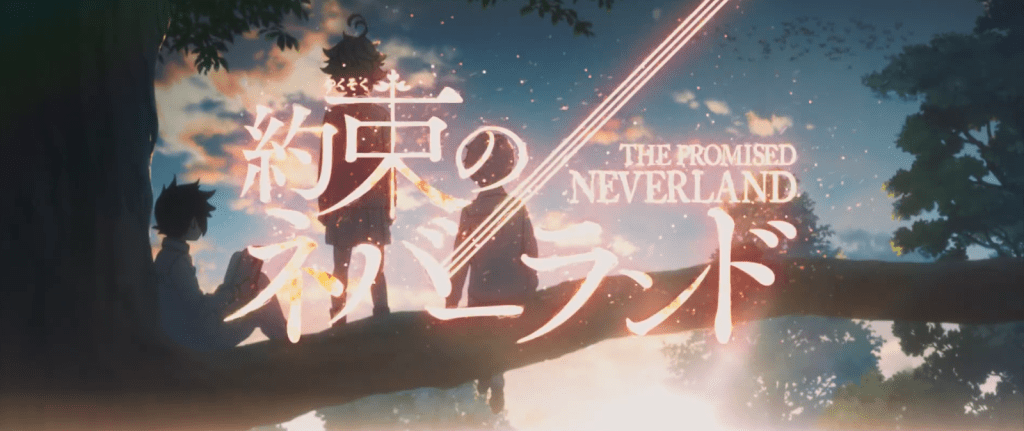
Legend of The Galactic Heroes (1988) (anime) – 10/10✨ ~ “In every time, in every age, the deeds of men remain the same.” ~ An incredibly deep and earnest space opera to best Star Wars and rival Game of Thrones in its scope, philosophy, historical-mindedness, and characterizations of the archetypes and dramas in play within long-game geopoliticking and warring. Rebel wunderkind Yang Wen-li fights for populist democracy while the elegantly childish yet brilliant Reinhard Lohengramm uses imperial prowess to try to create a unifying justice within a decidedly unjust universe. Plays beautifully with the contingent moments, the vicious cycles, and the conflicted personalities imperative to history’s grand flow.
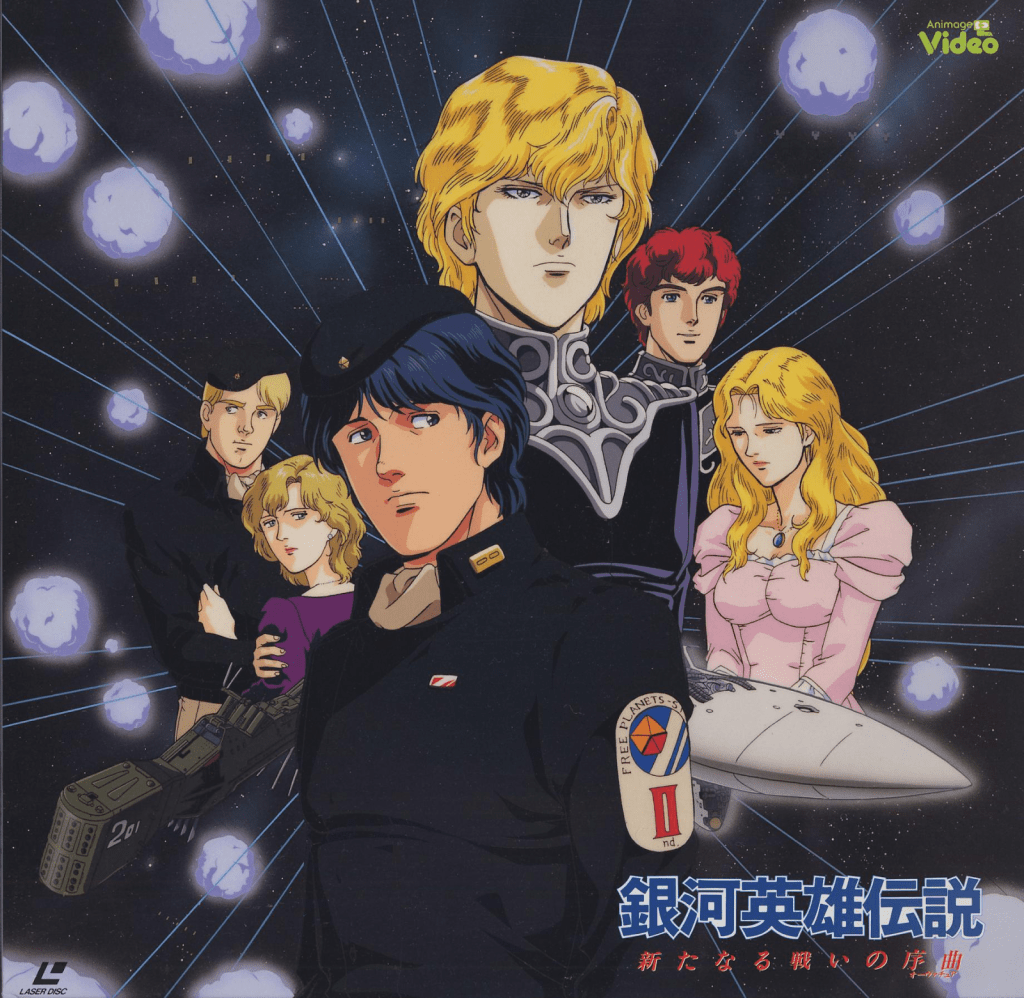
Fog Hill of Five Elements (2020) (Chinese anime) ~ 9/10 ~ God-tier fighting animation in this beautiful yet short Chinese animation series. Mythic elemental fighters face off against demons in artful, dazzling duels; a painting-style animation unleashes movements and attacks at a relentless, breakneck pace that can be difficult to track all the awesomeness of… A must watch for all fans of animation and action.

The Queen’s Gambit (2020) – 9/10 ~ “Girls do not play chess…” ~ A story of a proto e-girl and her simps… Great story and characters. About obsession, and growth. Beautiful performance by Anya Taylor-Joy.

Jujutsu Kaisen (2020) (anime) – 9/10 ~ Fast-paced and expertly animated battle anime. Curses as monsters and sorcery as martial art, with complicated fighting techniques spawned from human misery. Affable characters. Some tragic stories. Great fun. ~ “Infinity exists everywhere.”

Love is War (2019) (anime) – 10/10 ~ High art comedy of a pair of confused and competent teens aspiring to outwit the other in the game of love. Chika is one of the best side characters ever! Fantastic opening sequence and song.

Can’t Get You Out of My Head: An Emotional History of the Modern World (2021) (documentary series) – 9/10 ~ Love, power, money, ghosts of empire, conspiracies, artificial intelligence and You. An emotional history of the modern world by Adam Curtis. / “…All human beings live in a made-up dream world of stories, which give them the illusion they are in control. When really, there is something else inside them that they will never contact…”

Space Dandy (2014) (anime) ~ 8/10 – Comedic animated mania in a wacky universe of aliens and boobies. A fun and highly varied romp throughout the stars from the same director of Bebop and Champloo. Who doesn’t love a big spaceman goof with a heart of gold?
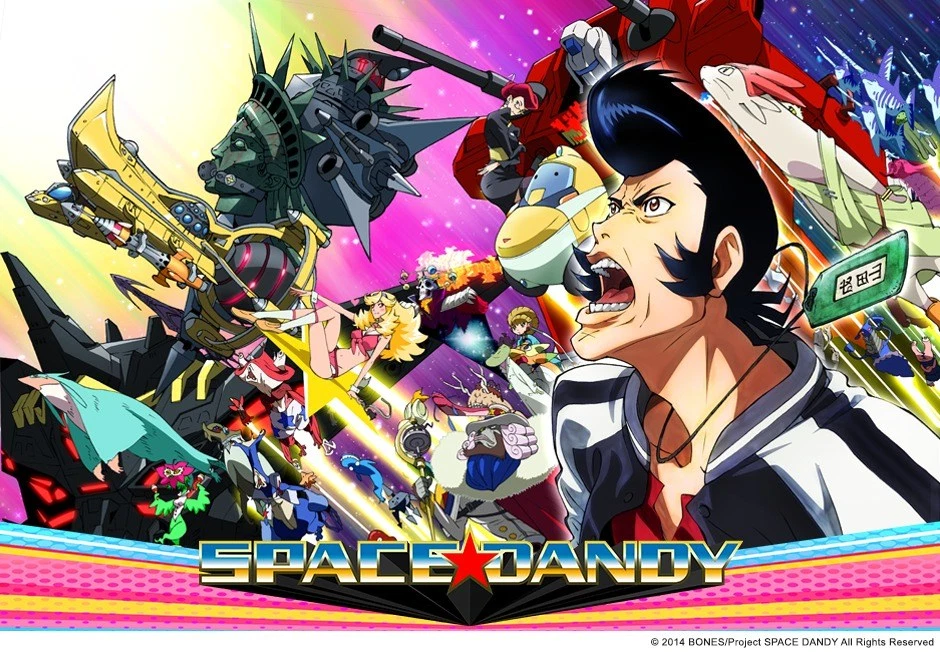
Mononoke (2007) (anime) ~ 8/10 – “The Shape, Truth, and Reason…” ~ Very inventive fantasy-horror animation featuring highly emotional, unique, multi-part story arcs. Ghosts, demons, “mononoke” are our extreme emotions manifested into the world around us. And they must be exorcised by a medicine man. But not before he fully understands *why* they exist in the first place.

The Mandalorian (2019-2020) – 8/10 ~ “This is the way.” ~ Slow burn Star Wars lore in a Western landscape. Pedro Pascal (one of my favorite dudes) delivers an understated but excellent performance as a masked lone wolf slowly learning to embrace a family. Season 2 features some of the best Star Wars fight scenes you will ever see.

Invincible (2021) – 9/10✨~ Shockingly good show. Inventive, impressive story. Another subversion of the superhero tale, ala Watchmen, Superman: Red Son, Kick-Ass, Injustice: Gods Among Us, The Boys, etc. with the ultraviolence, potential tyranny and mass death that would take place in a world with such monsters and gods flying about. Boasts some great animation + action sequences.
A satisfying overall watch, with many interesting threads and characters beyond the core story surrounding Omni-man and his son, Invincible. Balances the high stakes and low stakes, the conventional and the highly, violently unconventional – Omni-man’s mysterious quest and his battle against the Global Defense Agency vs. Mark’s coming-of-age beginnings as the hero Invincible and his romantic / identity struggles as a young man. And there is so much lore! So many questions and partial explanations and world-shaking implications regarding certain heroes, powers and technologies. Damien Darkblood, demon detective! Robot and Monster Girl. The Mauler twins and their cloning tech. The cat warrior from another dimension that gives all the supers the work and then peaces out!! All of the technology of the GDA and Cecil’s knowledge and past… And finally, the true motive of the Viltrumites and Omni-man as their representative on Earth.
Invincible creates a big world that still manages to be small and personal where needed, such as Mark’s disparate relationships with his dad, mom, Amber, Will, Eve, and Titan, which is an impressive juggling act, managed well through the season’s run.
More than anything, the success of this show perhaps indicates what we want more of from our {semi-saturated} superhero entertainment: real blood and guts, the real ramifications from superpowers played out to their sometimes thrilling, sometimes horrifying ends. ~ https://thresholds-of-transformation.blog/2021/05/09/doctrine-of-the-invincible/

My Hero Academia S5 (2021) (anime) -8/10 ~ Heroes from classes A and B fight each other in the latest UA examination. More combat strategies and more fun from the Marvel-esque anime of heroes and villains in heartfelt battle.

Terror in Resonance (2014) (anime) – 8/10 ~ “No one can silence your voice now.” ~ A self-contained little series about terrorism and Icelandic music. Two young men, government experiment savants with predetermined lifespans of nearly pure solitude and suffering, plot against their oppressors with puzzles, bombs and messages. A young girl with her own struggles accidentally gets caught up with them and changes the dynamics of their convicted quest. Beautiful animation and music with a profound moral concerning the potentially inhumane terrors of modern science.

Serial Experiments Lain (1998) (anime) – 8/10 ~ “There’s no other me but me, right?” ~ A disturbing exploration into a young girl’s psyche at the inception of the Internet Age. An unsettling collection of images and sounds paced for maximal tension and contemplation. The Wired {The Internet} is an alternate reality that Man has started to fall into. SEL asks “what if a lonely little mid school girl logged on too?” / Dreamlike, this anime throws around audiovisual arrows of stark alienation and soul-sapping dissociation within the dawning cyberworld, mediated through the godlike collective unconscious, our ancient, evolved ansible of omnipresent communicae, now manifested into incomplete, flawed beings that float around and do f*cked up stuff. Once the digital realms are established and turned online, from that moment on – all of us are connected, whether we know it or not. Lain is one of them, especially born with a brain for it. {We are one of them, now living with brain irrevocably changed by it}. What to do with these connections, in cyberspace or out in the real, in the meat? What to do with all of this power, over the mind and its memory? Lain must decide this for herself. {Related question: what have our Shadows been getting up to all this time within the digital realms, beyond the notice of our lulling eyes and fastidious twitter fingers? Truly, what kind of new being has the Internet transformed us into??}

WandaVision (2021) – 9/10 ~ “What is grief, if not love persevering?” / “When you let us sleep, we have *your* nightmares!” ~ Creative psychological exploration in the aftermath of the Infinity War upon Wanda. Part comedy, part mystery, part sci-fi, all love story. What happens when one of the most powerful people in the world becomes grief-stricken and depressed? Beyond heroics, clearly what Wanda wanted most of all was a family with Vision. And when that is taken away, for the first time she is willing to tap her full powers to make that dream a (un)reality. The result is a mind-bending – and at times, profoundly sad – journey into the heart and mind of the Scarlet Witch, born from the darkness of death and despair. {I mean c’mon who doesn’t rewrite reality a little to cope with trauma..?}
Overall, the mini-series is structured as an inventive way of introducing the Marvel universe to episodic content, with a meta-commentary on the art of the TV sitcom itself through the years. Riffs on their zany gags, too-perfect plot circles, and consistently heartwarming resolutions. How about the fact that the side characters are lifeless and unmoving beyond the sphere of the mains, as tulpa-Vision discovers on the Halloween special. Or how even in the midst of all the chaos, the half-hour runtime is promised, no one ever dies, and no inter-episode trauma is really carried… All things Wanda desired with her life shattered into pieces. With the mind control, amnesia and rewinding, the sitcom paradigm twists to surreal horror.
Along the way, Wanda manages to inadvertently revive the conception of the American small town community from the mid-20th’s ashes. {Somber to consider that it will take literal magic to bring such a thing back..} The Westview incident also unites two small-time MCU favorites, Darcy and Woo, with a new addition in Rambeau, to chase Wanda toward her destiny. Also, Kathryn Hahn as nosy neighbor/power-thieving dark witch Agnes/Agatha Harkness was great.
By the end, an emotionally satisfying arc for Wanda, easily among the best in the MCU thus far. Looking forward to the chaos magic wherever in the multiverse it all goes next!

Giri/Haji (2019) – 9/10 ~ “Birth is agony. Life is hard. Death is cruel.” ~ High art drama themed with a variety of dualities. Love/justice. Betrayal/redemption. ‘Duty/shame.’ Plays with complex, tragic characters on a collision course. Many plots, all interesting and invested into. More than just a 2-man detective/criminal tale, it is a multifaceted character study; every side story carries a meaningful arc. Inventive cinematography that builds the scenes and highlights the environs. Modern, realistic, stylish, with more than a few surprising twists and strong performances. Advanced and compelling television. A worthy watch, from beginning to end.

Bo Burnham: Inside (2021) – 10/10 ~ “Get your fucking hands up.” ~ Entertaining and enlightening comedy. Bo is a manic magician in an enclosed space, hyper-aware of the world and of himself. He sings of alienation and obsession and the wonders and terrors of the internet from first-hand experience, as a patient zero player in youtube stardom. Alone in a room, with his machines and his voice, he crafts a satisfying and funny! {if melancholy} journey through the psyche of now: 2021. It is in the cuts between the songs that doses of a tragic reality arrive, of a person struggling to *exist.* There are both laugh-out-loud moments and silent breaks and pauses where all you wanna do is cry… One way or another, I hope Bo keeps creating. And I hope he is OK.

Manufacturing Consent: Noam Chomsky and the Media (1992) – 10/10 ~ “You can’t fight the world alone.” ~ A view of Chomsky’s life, his accomplishments and activism, and his core theory about how America’s consciousness – and consent – is manufactured by the mass media. The media is an enterprise dominated by a specialized class – “the ruling class” – with its own special interests, corporate powers and governmental access. Those interests are money, and power, and control. Their rule is violent and unjustified and yet continues. The only way to hope to fight is to become aware of these facts. Inspiration comes with the spirit of organizing, and the knowledge that a *spiritual transformation* is both necessary for change, and in a recursive sense, contributed to by the beginnings of such change. Also, young Chomsky was hot.

Hamlet (2018) ~ 10/10 ~ “Words without thoughts never to Heaven go.” ~ Entering the mad dream of Hamlet, modernized and performed with hyper-real minutia from the actors, especially Andrew Scott. The existential drama of grief, depression, rage, and passion is played out primarily on Scott’s pained countenance, from his whispers and screams of impossibly rich dialogue and monologue. Whether it’s madness or performance, Hamlet’s game sources from a *true* passion; the play is the dream of his mind’s real turning, presented with every painstaking shift and evolution for us to see. Who gave more thought to his words than Shakespeare’s Hamlet? That is why his words still reside with us.

Dying To Know: Ram Dass & Timothy Leary (2014) – 8/10 ~ On the art of expanding your consciousness via psychedelics; in the span between birth and death, what kind of life will you lead? What kind of light will you share? What knowledge and passion will you harbor? What kind of journey will you undertake? Listen to these guys – be ambitious, make some friends, do some medicine, embrace death with a grin, more than ready for the final journey.
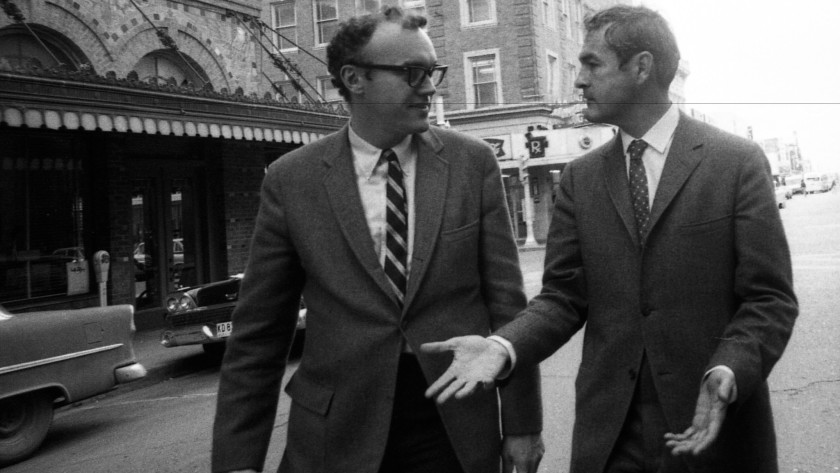
Third Eye Spies (2019) – 8/10 ~ Psychic abilities are real!

Tony Robbins: I Am Not Your Guru (2016) – 8/10 ~ “What makes people feel alive? What makes us transform?” ~ Watching Robbins perform in his mega-event, with teams of micromanaging support staff relentlessly seeking out solutions and candidates for “breakthroughs”, while he goes into public speaking flow states, picking people out of the crowd to cut to their core and deliver to them what they came into his orbit to get, was honestly incredible. Propaganda or not (what critical, counterpoint messaging did people want from this doc?), full of theatrics and production values meant to engender inspiration above all – what does it matter if people *believe* and change their lives in response to such an experience? There is something very real happening here. People need inspiration. They need a reason to believe in themselves. They need to awaken from the prisons that they have created and escape with their own power. That is the only way to feel alive. Self-determination is the way to transformation.

Star Wars: Clone Wars (2003-2005) (rewatch) – 10/10 ~ Top-notch animated storytelling. Expands and enhances the Star Wars prequels with the best versions of Count Dooku and General Grievous, and maybe even Anakin. An intriguing sith upstart in Asajj Ventress arrives and makes for an epic showdown with our young hero. Overall, a perfectly paced, two-part adventure with enough patient, well-refined action to satiate any animation or Star Wars fan. Drawn in the style of Tartakovsky’s other seminal action cartoon, Samurai Jack, Clone Wars manages to capture the essence of Star Wars while also showcasing characters and roles that never get enough time in the films: such as the clones themselves. We even get to see more of Yoda’s personality, and Mace Windu’s solo badassery, along with many of the Jedi Masters fighting in massive conflicts on land and in space, even underwater. This and the game Knights of the Old Republic are 1a and 1b for my favorite Star Wars media of all time!

Squid Game (2021) ~ 8/10 ~ “It’s just as bad out there as it is in here.” ~ About how debt turns people into slaves. The capitalistic economy makes everyone conmen. The game players are less failures and more just con losers. An infinite field of loan sharks, disappointed loved ones, and empty promises create despair, despair enough to turn the hellish game into a clear preference to reality. Money owed without a safe and reliable way to pay it drains self-esteem to the point of madness. In that madness is manipulation and violence unto fellow workers in the exact same position. Truly devastating stuff. Also, play Danganronpa.

Midnight Mass (2021) ~ 8/10 ~ “Remember you are dust and to dust you shall return.“ ~ An intriguing yarn into God, death and misinterpretation. King and Exorcist references galore, small town, mysterious powers, a culminating cross-stitch of intertwining destinies and finale twists that further bind the community’s intersections and ironies. Love the overarching concept of an aging priest being visited & restored by a vampire and thinking it an Angel from God, with his blood spread then not as monstrous hunger but as divine revelation. The performances in some scenes truly makes you face what experiencing a true miracle might be like. Witnessing someone walk again, a recovery from dementia. What a feeling that would be, for the person, for their community! The ridiculous monologues present characters as mouthpieces for full worldviews throwing down poetic run-ons. Definitely ridiculous but once I saw that is how the story was being told, it was fine. There are some solid word collections, a few good turns of phrase. Good story, characters, performances overall.

Hannibal (2013-2015) – 10/10 ~ Will and Hannibal are canonical “nakama” (仲間)
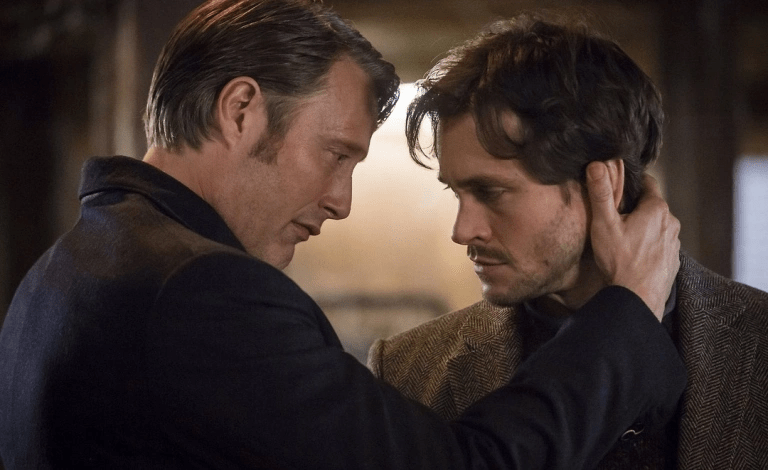
Succession (2018-2021) – 9/10 ~ A surprisingly thrilling family drama, part satirizing comedy about terrible ruling classers and part Shakespearean tragedy about fatherhood and power.

🎃SPOOKY SZN🎃
Carnival of Souls (1962) – 8/10 ~ “I don’t belong in the world, that’s what it is. Something separates me from other people. Everywhere I turn, there’s something blocking my escape.” ~ Saw another reviewer refer to this as a “daymare” and that could not be more of an accurate description. The progression of its plot got me thinking: if her journey is a movement down into the underworld, and she starts by playing the organ in church and ends up wandering into a carnival – the titular “carnival of souls” – thus carnivals can be seen as the inverses of church, then does that make clowns *demons*? But then, with her love life, it goes from non-existent to alive, with real feeling suddenly summoned along with a desire to be with a man. So then, while she approaches death her libido also increases, and sexuality is represented within the under-realm. But then death trauma ruins her relations and she returns to aloneness, to darkness and furthering madness. As you approach death, your desire for life becomes more tangible, and more desperate. Good picture. overall very weird and inventively filmed and with a tense, intriguing soundtrack.

Alien (1979) – 9/10 ~ “I admire its purity. A survivor… unclouded by conscience, remorse, or delusions of morality.”

Aliens (1986) – 10/10 ~ “Building Better Worlds.” ~ Cameron builds out a world. Well-paced story with a complete arc for Ripley as a survivor and a mother, a rival to the monstrous Queen. A fuller sci-fi action production to continue the story of the alien and Ripley; retains the horror while adding history and humor to the mix, alongside some good old fashioned, double-edged alien massacring. … Doubles down on the first film’s critique of capitalism. Corporate bureaucracy + the extractive industry + space exploration to the furthest reaches really don’t mix. A pure extraction philosophy, in fact, aids and abets the perfect apex predator in its hunt for our extinction. The profit motive, like the xenomorph hive’s endless hunger, is inhumane, cosmic horror. … The terraforming human colonists and engineers and soldiers are all mercenaries and scavengers desperately searching for “scores” even while they “build worlds” and execute their “bug hunts.” This far into the future, with advanced spacefaring tech, people are still selling their lives to the economic system. Under late-cap’s regime spread into the far future, space colonization becomes the extension of our current gig economy, with impoverished families beating themselves to trip over strange eggs on the far rim and unleash the end times. … The grimy Alien universe’s world is truly the inverse of Star Trek’s clean, luxury space communist reality. Coercive hypercapitalism is taken to the edges of its limits — finally! but only by a true alien lifeform of equal strength to us, fit to overcome us. … “Get away from her, you bitch!” — Ripley is solidified here as the best final girl in horror and as one of the best characters in cinema. Book it! Sigourney is a 🐐

Memory: Origins of The Alien (2019) – 7/10 ~ “The reek of human blood smiles out at me. ~ Details the origin of the terrifying alien being birthed from a mythic symbiosis of our nightmares. A force of “destructive evolution,” the xenomorph represents the ultimate terror: an unknown, unstoppable force of human predation. Learn that Alien (1979) is heavily inspired from, and is in fact a spiritual re-telling of, Lovecraft’s “At the Mountains of Madness” (1931) — unwitting explorers uncover the remains of an elder race, who unleashed a monstrous and indestructible evil into the world that wiped them out and still resides there, beginning to hunt them… Perhaps most importantly, the doc delves H.R. Ginger’s 🐐‘ed design for the creature, even after being fired from the project while it was in development hell. Working class exploitation, a critique of imperialism, the omnipresent violence of male penetration — it’s all outlined here on the best sci-fi horror cinema of all time and its best monster. A good doc on a great film.

Prometheus (2012) (rewatch) – 7/10 ~ “There is nothing in the desert, and no man needs nothing.” ~ Did David learn narcissism from Lawrence of Arabia, did movie magic turn him evil? … A disjointed narrative with some stunning visuals. Prometheus asks questions like: what is the origin of Man? Are we destined to destroy ourselves, to disappoint God? What if you baby-talked at a little alien worm guy and got instantly killed and you deserved it? … The sheer dumbness of the trillion dollar expedition’s crew takes away from the premise, but the David scenes (this and Covenant (2017) are truly *his* story and that’s great) and the overarching mythology are top notch. What we wanted from this we mostly got – a satisfying extension of the alien lore. The core thesis may not be purely nihilistic, but it is terrifying: We come from goop and we can definitely fuck this whole thing up.
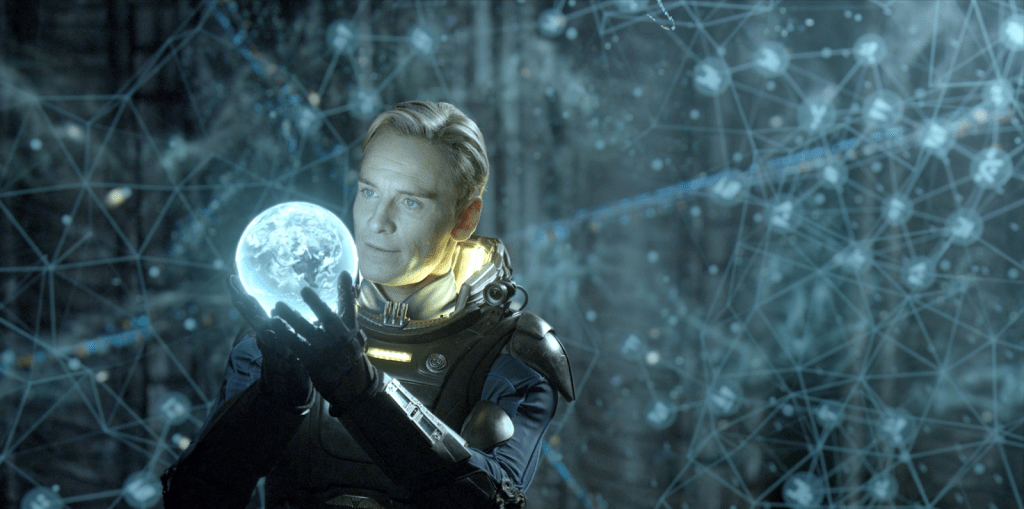
Halloween (1978) – 8/10 ~ “Death has come to your little down, Sheriff.” ~ Michael Myers could only pull this off in a small town like Haddonfield, Illinois. You know if this guy pulled up in NYC or LA, he’d get owned by a rival sicko or just be forced into losing all his patient, murderous mystique in a pure supernatural massacre kill streak. Either way, the movie would be way different. But yeah this thing is pure movie magic. Best music in horror. It’s immortal, just like him.
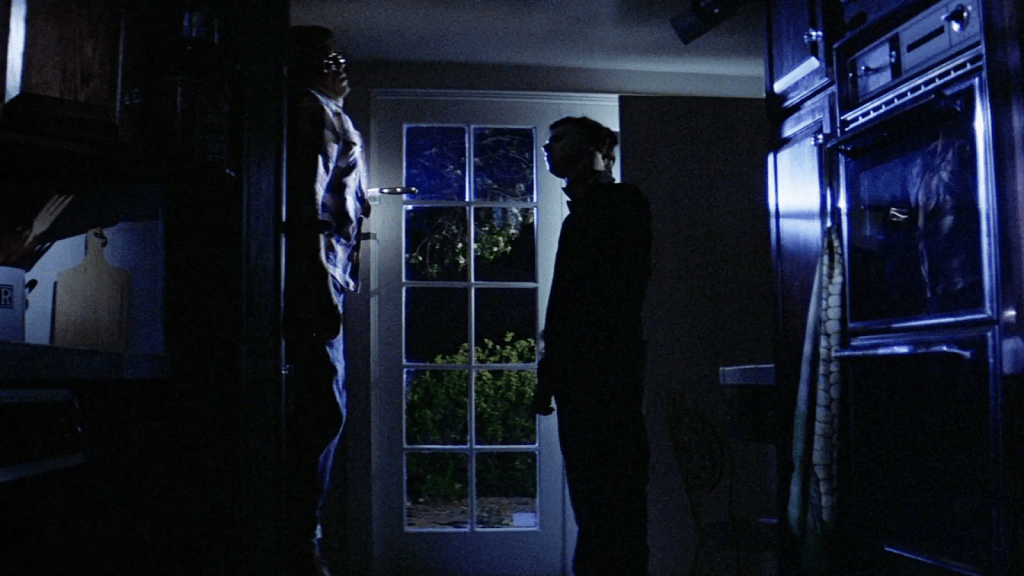
The Shining (1980) – 9/10 ~ “All work and no play makes Jack a dull boy.” ~ The Torrance family is America and Jack is our abusive, racist elderly father who doesn’t know his kid and secretly hates his wife and we are in the middle of act two. You could even say Grady is the UK handing off the reigns of responsibility, to a bloody empire, to the US. Oh yeah and remember the Overlook is built upon “an Indian burial ground.” … The Shining is a charming movie even while it’s unnerving and then terrifying you. Incredible imagery and musical pairings. Nicholson’s face acting is the best of all time in this. Duvall’s whole performance is as believable a performance in horror or anywhere else. Great flick.
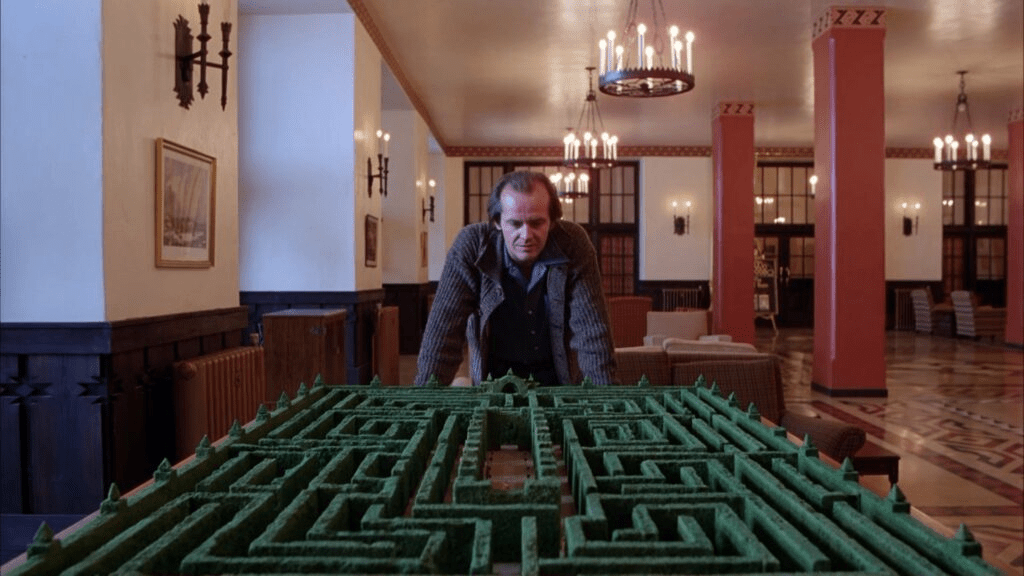
Halloween III: Season of the Witch (1982) – 6/10 ~ “It was a part of our world… our craft.” ~ In the running for the most insane plot I’ve ever seen, alongside Pirates of the Caribbean III: At World’s End. Evil billionaire who made his money doing pranks(??) and controls the TV (nationally? Globally??) uses children’s Halloween masks and an obnoxious commercial jingle to turn kids into bugs and snakes??? For a giant ritual sacrifice because he’s a witch. And he needed to steal Stonehenge to do it. Lmao. Oh yeah and he has an army of androids to do his bidding, that can rip people’s heads off with their bare hands and then automatically set themselves on fire to bury themselves as evidence. It’s like a forgettable, early season X-files plot but made into a movie and thrown into the Halloween franchise (as Carpenter originally intended, as an anthology series with Michael Myers only in the first one). This movie is not good, but it is very interesting and I’m glad it exists.

Scooby-Doo on Zombie Island (1998) – 8/10 ~ “We do not have television on my island.” ~ Zombie Island is a dream and I wanna live there … A profoundly animated caper that subverts the Scooby myth by building out a real ghost story with historical and metaphysical stakes to match the Mystery Machine’s hijinks. Scooby-Doo on Zombie Island is a mystic revenge tale where nothing is as its seems. Presents the crew as ‘grown up’, retired from their childish paranormal investigations into the ruling class’ last harmless goofery (acting like ghosts and monsters for cash register-level heists). The rich old man masked as a ghost scheming to get one over on the bank or real estate firm or family estate runs dry. The economy that the Scooby gang exploits is finished. And so they resort to their archetypal roles within modernity’s machine. Fred and Daphne become a local news team; Velma reads dusty books as a bookseller that no one comes to (who is still reading?); Shaggy and Scoob work as minimum wage slaves and begin to waste away, losing their patented love of life within the alienation. And then comes one last job. A real haunt. On the Louisiana bayou, where an old plantation meets the lurch of a swamp, the blood-soaked lands birth real horrors. The Mystery Machine drives into the narrative with a clear-eyed enthusiasm to be their old selves. Then the terrors come. They are frightened and then emboldened. Fred and Daphne become a heroic duo fighting for the truth; Shaggy and Scoob’s horrifying sprints lead them into fresh discoveries and life-changing ironies to equalize their idiocies. Velma’s deductions lead her toward love. The gang rises to the occasion against true-blue witches. Simone and Lena are somewhat justified in their revenge; by using a former stronghold of oppression to hunt the relatives of their ancestor tyrants, there is a ghastly vindication in the existence of the Scooby Universe’s only real confrontation with supernature. The witch life actually seems pretty ideal – immortality traded for a monster cat transformation ability. Who doesn’t take that deal? Ah but even more than the witchery, being in a Scooby-Doo-like gang of adventurers with your best friends is the ideal life in this world. And so few of us have it. Not yet. Here’s hoping. 5/5

The Thing (1982) (rewatch) – 10/10 ~ “We’re not getting out of here alive. But neither is that thing.” ~ The perfect horror sandbox. Remote arctic base runs in with a shapeshifting alien force from deep space and deeper nightmares. The thing’s unique adaptability is matched only by its intelligence and willingness to evoke its spindly goopy horror at the drop of a hat. Kurt Russell is playing chess against the monster the whole film. Survival turns into a cage match against a cosmic force of impossible evil. Does Mac give Childs a bottle of oil at the end? Either way, the thing lives on in ice, ready to destroy the world. Cool.

GAMES
Cyberpunk 2077 (2020) – 9/10 ~ Realized world of rain-soaked, neonic dystopian struggle, well-built and well-written. The bugs and the controversies take away from the journey but do not spoil it entirely {just make sure you can run it!} Solid first-person controls and action, with high degree of combat customization along the lines of melee/gunplay/hacking perks. For me, the best part of the game was the story and characters, and specifically the side stories. The ‘Cyberpunk‘ TTRPG world and history crafts a universe of terminal inequality and elemental desperation, where certain masses vie to become criminal legends, *that* being the new American Dream, the only possible glory left to them… And to you.
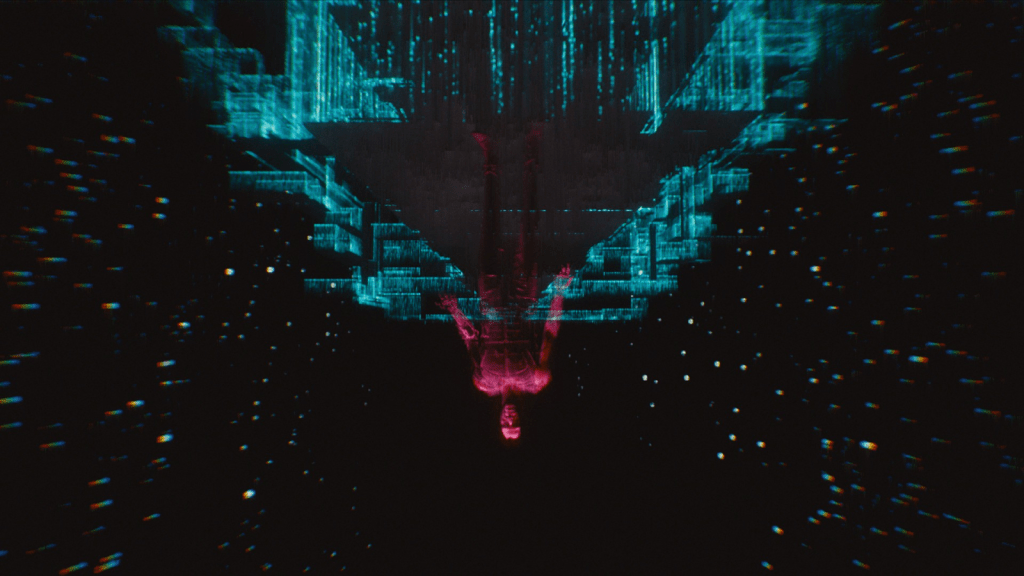
Saints Row: The Third (2011) – 9/10 ~ A fun first open-world romp of ridiculously over-the-top proportions! Join with a bro on arrays of inventive and exciting missions of ultraviolence and comedy, one after another. Addictive and better than it has any right to be…

Gears 5 (2019) – 8/10 ~ The meaty, gore-filled chainsaw-machine gun battler refined to its most primal essences and juicer than ever. The next-gen COG soldiers face off against a wide variety of harsh environments and harsher foes; also, with Kait as its face, the 5th game surprisingly manages to tell a more compelling story than any of the iterations thus far. Campaign ends with serious unfinished business however, setting up yet another sequel..

Danganronpa: Trigger Happy Havoc (2010) – 9/10 ~ A twisting roller coaster of mental pursuits and emotional revelation. Trapped in a life-or-death game of survival, murder and trickery, a wildly satisfying story unravels our 15 “Ultimate” high school students, each with their secrets and surprises. An impressively-designed visual novel, linear but well-written and features plenty of quality gameplay elements to spell all of the reading. Play it for the plot! And for the friends you will make along the way. Great ending.

BloodRayne: Terminal Cut (2002) – 8/10 ~ The ultimate Nazi Genocide Simulator. You play as a sexy redhead dhampir {half-vampire, half-human} assassin dual-wielding arm blades and MP40s, massacring her way through the Reich. Excellent action game, full of high acrobatics and satisfying hyper-violence under a solid control scheme. Oh and Rayne is voiced by the lovable Laura Bailey.

Stranglehold (2007) – 7/10 ~ “Give a guy a gun, he thinks he’s Superman. Give him two and he thinks he’s God.” ~ An insanely-paced and fun-first shooting gallery reminiscent of an arcade game. A sequel to the masterful action film Hard Boiled (1992), John Woo’s talents translate well into the realm of digital entertainment, as his high art action set pieces were always already video game-esque, in the best possible ways. “Tequila Time” is one of a kind, and the people want a sequel!

Fallout: A Post Nuclear Role Playing Game (1997) – 8/10 ~ Deep lore and deeper nostalgia (for those who originally played it). I was not one. Despite its age, I enjoyed the playthrough. Love the simplistic structure of the mini-areas of concise combat and conversation within the overland map of the wasteland to travel between them all. Not too long, not too short; good amount of variety to the story’s travails; some moral choice in who you want your wanderer to be. The devilish Vaults, the PipBoy and the whole future-retro aesthetic, giant bugs, super mutants and ghouls, the guns, stimpaks and designer chems, the Vault Boy comically gracing all of the perks — all the best Fallout lore originated *here*, in the very first entry. Good to know, for someone who started with Fallout 3. Still a worthy experience today for Fallout fans or newbies, just use a guide!

Baldur’s Gate: Enhanced Edition (1998) – 8/10 ~ An exhaustive D&D video game experience that still holds up 23 years on. The full monty of characters, classes, combat, and LORE on display. Wield classic magic spells and items, under a satisfying isometric gaze astride a party of goofy toons all carrying unique catch phrases into your constant war against goblins, gibberlings, gnolls, ghasts, ghouls and… xvarts. There are almost too many characters (your party caps at 6 in total vs. 25! recruitable party members), feel like I need to play through the game thrice to *meet* everyone worth meeting. Storyline is fairly conventional but manages to be a satisfying yarn that hits all over the Forgotten Realms planescape. You get to meet both Elminster and Drizzt! Take your time, do the sidequests, and once more, I recommend a guide or walkthrough to fully soak the paths available. More than anything else, this game just makes one want to play D&D with your friends, as player or manager – so many characters and plots, so much loot, so many ideas!
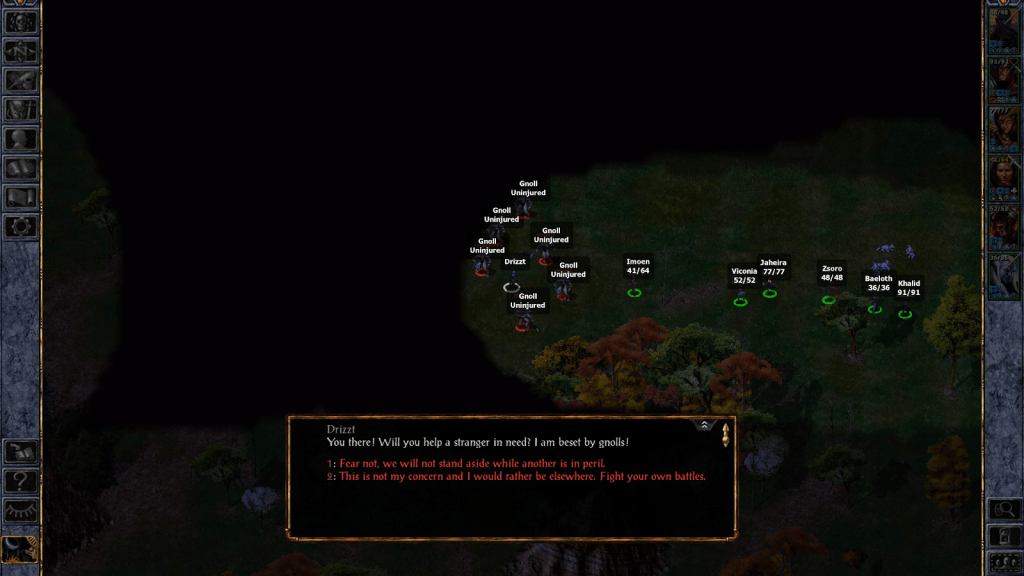
Fallout 2: A Post-Nuclear Role-Playing Game (1998) – 8/10 ~ Marcus was the best of allies and the worst of allies. ~ Sequel to Fallout, in the same engine but this time with more lore, additional places to explore in the wasteland and more powerful x competent companions… who just happen to critically shoot you in the back into chunks about 50% of the time in any given combat encounter (of which there are a lot more this time around). Good side questing / excellent power weapons / much more challenging / story overall was equally as satisfying as the first game.

Baldur’s Gate II: Enhanced Edition (2000) – 9/10 ~ King CRPG. Advanced Dungeons & Dragons techs inside another immersive story, continuing the saga started in the first game. Complex characters join you, returning favorites, such as the overly enthusiastic hero Minsc and the scheming arsehole Edwin, as well as fresh faces, each with a story of their own. Your quest will run you through tales of good and evil, power, companionship, duty, freedom, chaos… Something for everyone. The side arcs contain as much weight as the mains. {Also, in one sequence of the game, you can fight alongside Drizzt and The Companions of the Hall!} A must play for anyone that loves D&D, RPGs or great stories.

Touhou Luna Nights (2019) – 9/10 ~ Anime maid tosses thousands of daggers and can cast ZA WARUDO at-will. Great fun. Extremely well-designed gameplay loops.
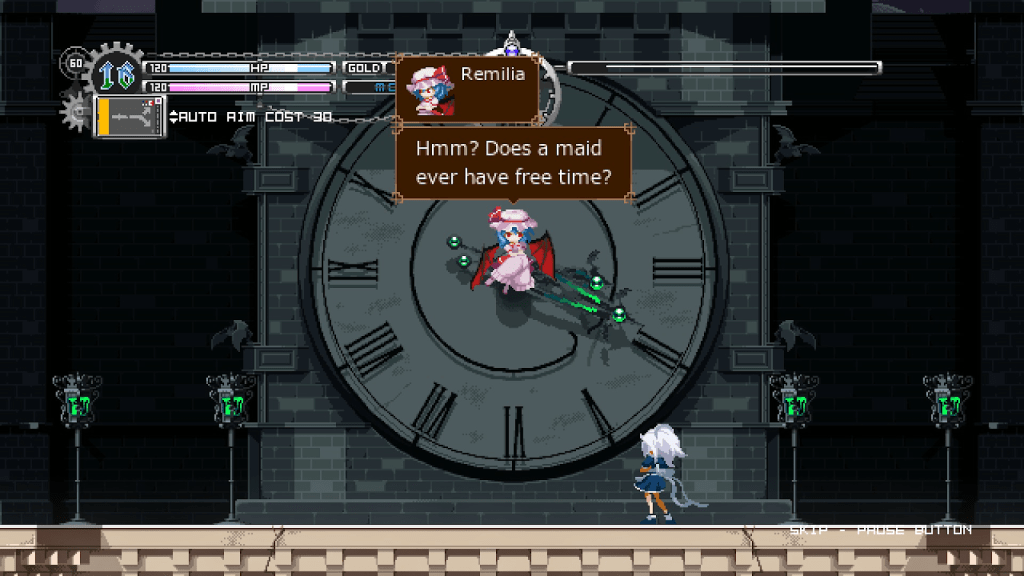
Star Wars: Knights of the Old Republic (2003) – 10/10✨ ~ The best Star Wars.

Star Wars: Knights of the Old Republic II – The Sith Lords (2004) – 9/10 ~ Cerebral space opera. Well-written characters, especially Kreia. Extends the mythology of the Force and its omnipresent influence upon the eternal battle between Jedi and Sith. What of a Force-user that indefinitely steps away from its flow? What of a Jedi-turned-Sith-turned-Grey that grows to *hate* the Force – and becomes powerful enough to potentially destroy it… and with it all life in the universe. / Quality gameplay. Force powers in combat still some of the best shit in games. Intriguing allies, with personal arcs {not quite as good as the first game} to contrast the universe-shattering conflict at the core of the story. Makes the KOTOR series into a great 1-2 cinema, which explores the nature of war, the fall of Sith, and the Force’s seemingly totalizing influence upon every consequential drama within the Star Wars mythos.

Dragon Age: Origins (2009) – 9/10 ~ Bloody tale of betrayal, corruption, and wayward destinies. Lot of sex and gore. Fun and challenging combat. Humans, elves and dwarves all doing some form of mystic murder-politicking, oppressing and genociding? Oh yeah. Essentially, Dragon Age is Baldur’s Gate brought into a new universe and onto next generation tech. An all-around satisfying adventure.
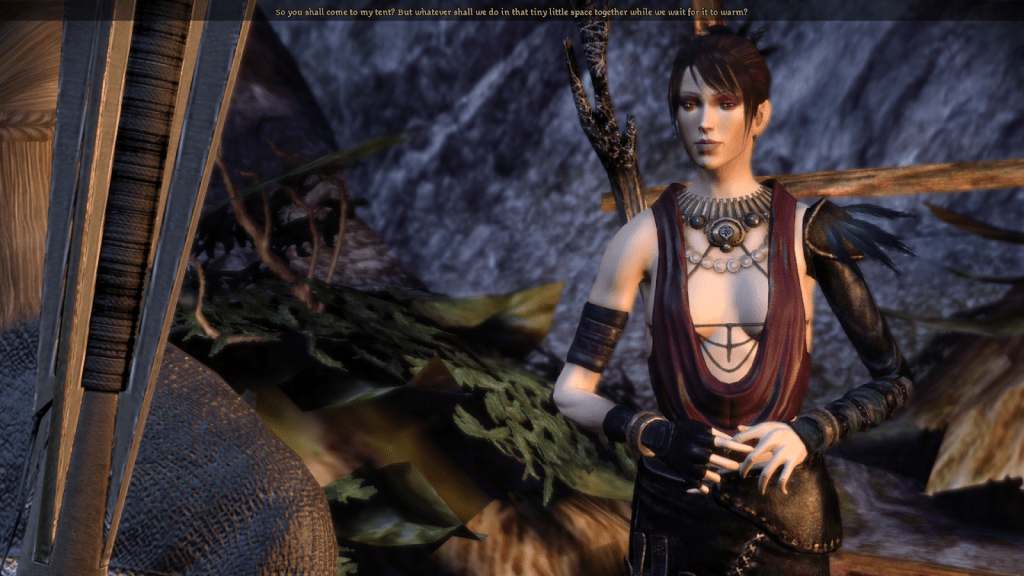
Sea of Thieves (2018) – 7/10 ~ Cooperative pirating on the high seas. Precious booty, sea shanties, satisfying wind and water physics, customizable outfits and ship stylings, The Megalodon, full bore cannonfire off the starboard side onto other player crews or ghost ship fleets, and role dysfunctions among the crew inevitably leading to a sinking down into Davy Jones’ locker – it is all here. Find three other friends and sail unto a good time.

Danganronpa 2: Goodbye Despair (2012) – 9/10 ~ Nagito Komaeda is one of the great characters of our time. Stands side-by-side with Atticus Finch and Jay Gatsby in the annals of fiction.

Mass Effect (Legendary Edition) (2007/2021) – 9/10 ~ Top tier sci-fi action adventure. Great story, characters, gameplay. A complete game. One of the best RPGs ever. Stop-and-pop biotic powers never get old! Legendary remaster delivers the goods – the same game(s) but refreshed and replayable. You have done well Bioware. 👍👍 … {p.s. The Reapers are real, they are The Great Filter to all organic life in the universe, and they are coming. We need to be preparing. This game should be mandatory playing for every human being in 2021. We will need you in the fight to come.}

Metal Gear (1987) – 7/10 ~ Where the Metal Gear mythos all began. A more in-depth and challenging game than you might expect with the technology. Lays down the series hallmarks: sneaking + weapon, item, and boss variety + a hierarchy of key cards and a ton of backtracking. I murdered so many people with Snake’s bare hands… Love the old video game music.
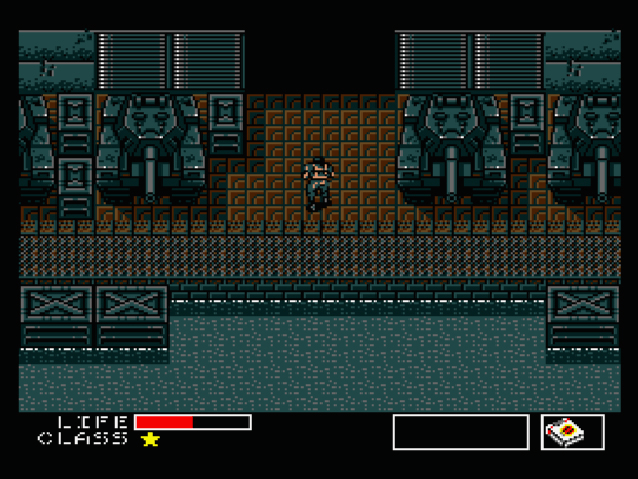
Mass Effect 2 (Legendary Edition) (2010/2021) – 10/10 ~ One of the best RPGs ever. Great side missions. Nearly perfected combat. A good traverse through the stars, with characters written for emotional impact. A video game that will resonate with you across all dimensions of gameplay, story, and character.

Mass Effect 3 (Legendary Edition) (2012/2021) – 8/10 ~ A satisfying conclusion to the ME saga, with copious callbacks and returns to close out the Reaper fight. Shepard becomes a nigh messianic figure by the end.
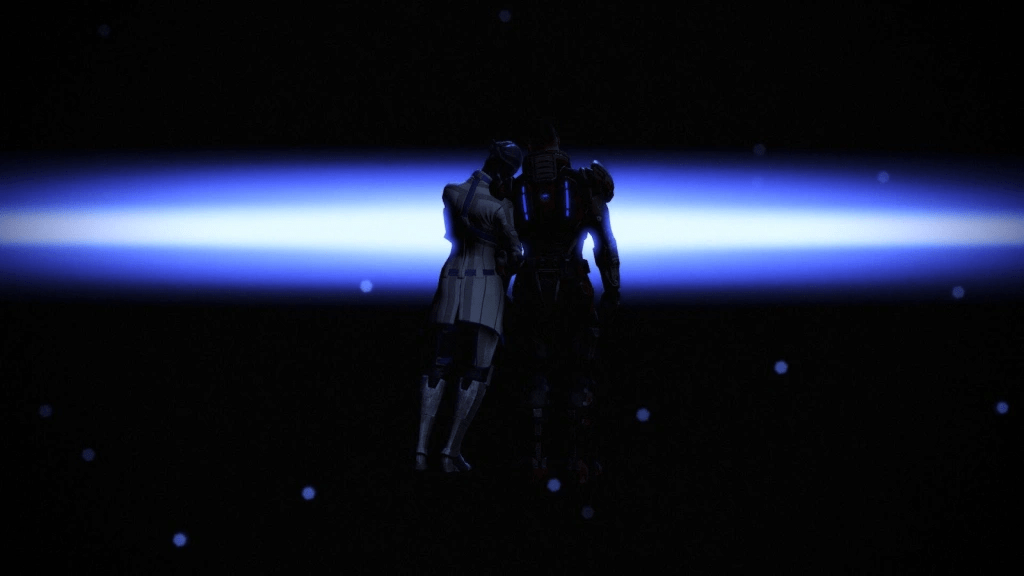
The Witcher (2007) – 9/10 ~ “…but I’m a witcher, killing monsters is my destiny.” ~ A dark fairy tale of blood, curses, and mystery, with a philosophical mutant warrior at its heart. Geralt’s twin swords for men and monsters make for a compelling narrative duality, and along with toxifying power potions and magic signs they create an intriguingly variable action RPG experience. The story is one of subversions and magic twists on classic fantasy scenarios; the best characters are witches, bards, and talking “monsters.” Geralt’s choices matter — make him a true hero, or just the merc monster slayer many see him as. Top notch game overall, still holds up today.

The Witcher 2: Assassins of Kings (2011) – 8/10 ~ “For now, a great battle awaits. A battle in which elf, dwarf, and human will stand side by side. And that is beautiful in and of itself.” ~ Geralt’s choices define your path to his past. A continuation of Geralt’s march through the kingdom, fighting besides kings and sorceresses while trying to regain his memory. A huge gameplay improvement upon the first installment, with a more reactive combat system with an intriguing skill tree. The story overall was less interesting than the first game, with Triss and Iorveth interactions standing out as highlights.

BOOKS
The Portable Jung (1976) — Carl Jung {edited by Joseph Campbell}

Man’s nature battles against his consciousness ~ It is the growth of consciousness which we must thank for the existence of problems; they are the Danaän gift of civilization. As long as we are still submerged in nature we are unconscious, and we live in the security of instinct which knows no problems. Consciousness brings about uncertainty, which means multiple paths can be taken. This cultivates instinctual fear. ~ “And here we are beset by an all-too-human fear that consciousness — our Promethean conquest — may in the end not be able to serve us as well as nature.”
The only things we experience immediately are the contents of consciousness. > A fear of God is the beginning of wisdom. >> Religious statements without exception have to do with the reality of the psyche and not with the reality of physis. >>> God wants to become Man; he wants to be among us.
~ Jung lays out his masterworks, that of the psyche and its *reality* as a shaping force of all human activity. In the unconscious mind, individually and collectively, we have the dominant but inexplicable actor upon our affairs. This is not unlike our circumstance in the cosmos, wherein dark matter, the invisible, implied power undergirding all existence, dominates and yet remains mostly unalighted to our comprehension. Continuously, we must contend with the unknown in order to grow as human beings; seeking to understand the mysteries of the psyche and your own personality and the process of unconscious input and output is absolutely necessary to these ends. And ultimately possible.
Out of the Silent Planet (1938) — C.S. Lewis
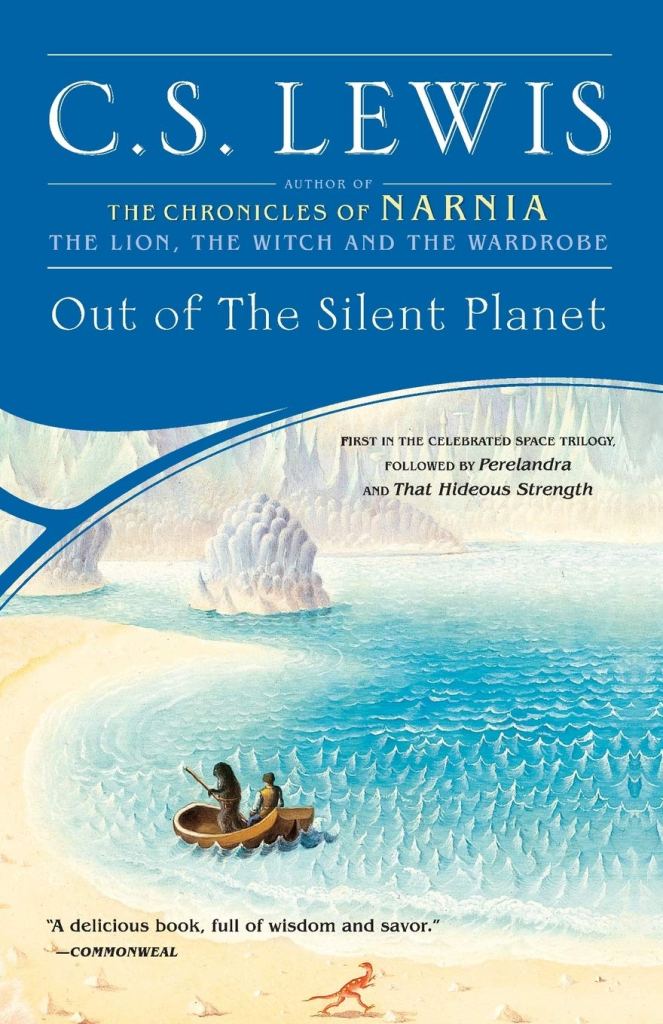
“I suppose all that stuff about infinity and eternity means that you think you are justified in doing anything—absolutely anything—here and now, on the off chance that some creatures or other descended from man as we know him may crawl about a few centuries longer in some part of the universe.”
It even occurred to him that the distinction between history and mythology might be itself meaningless outside the Earth.
~ A tale about humanity’s greed and our relentless quest for domination – with it comes arrogance and stupidity with regard to interacting with novel, alien cultures.
Faust (1831) — Johann Wolfgang von Goethe

Time is short, and art is long.
FAUST: Do you understand the new power of being That a walk in the wilderness can bring?
To you, love, feeling, faith, madness are owed.
THE ANGELS:
(Soaring in the highest atmosphere, carrying the immortal part of Faust.)
He’s escaped, this noble member
Of the spirit world, from evil,
Whoever strives, in his endeavour,
We can rescue from the devil.
And if he has Love within,
Granted from above,
The sacred crowd will meet him,
With welcome, and with love.
~ Mystic and strange fable on the hubris of Man before the Heavens.
GTO: Great Teacher Onizuka (1996-2002) (manga) — Tohru Fujisawa
“Toss the whole teacher/student thing. Just treat them like people.”

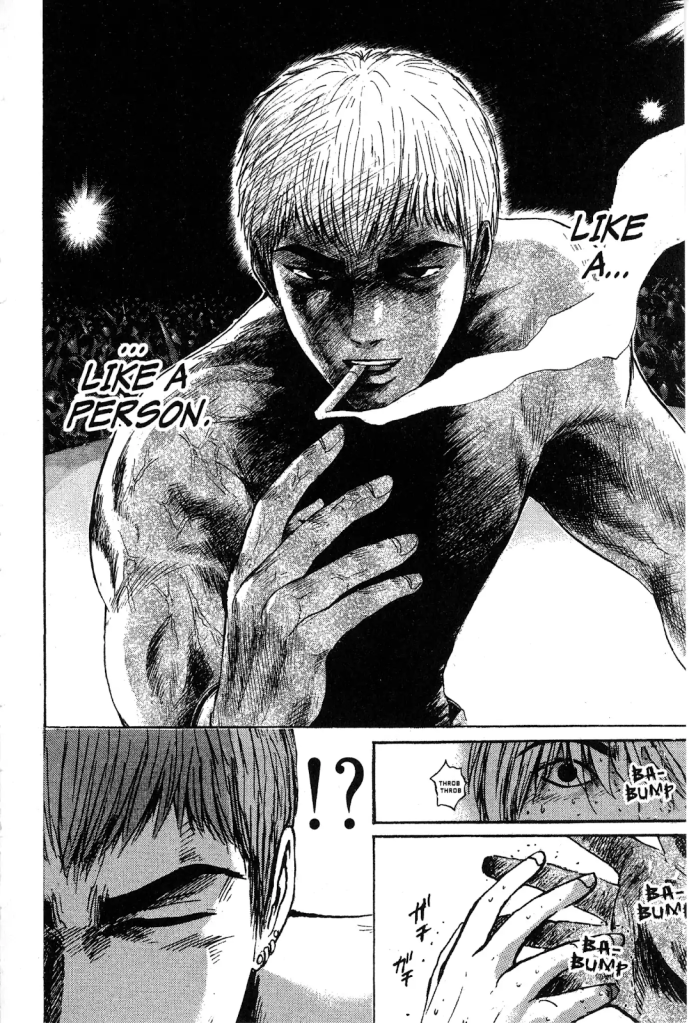

~ Perverted, funny, and ultimately profound coming-of-age dramedy of a teacher and his students in mortal combat with one another upon the plane of life.
Attack on Titan (2009-2021) (manga) — Hajime Isayama
“The Titans are not our only enemy…”



~ Epic tale of an alternate history for humanity, where the specter of “Titans” – ranging from mindless to apocalyptically-cunning monsters capable of untold destructions – plagues our most dire conflicting histories of oppression and war. Full of social commentary, mysteries, twists, turns, and transformative, unforgettable moments that beautifully interconnect the saga’s most vital arcing. Easily one of the best stories I have ever experienced, on the page or in the animation.
King, Warrior, Magician, Lover: Rediscovering the Archetypes of the Mature Masculine (1990) — Robert L. Moore, Douglas Gillette
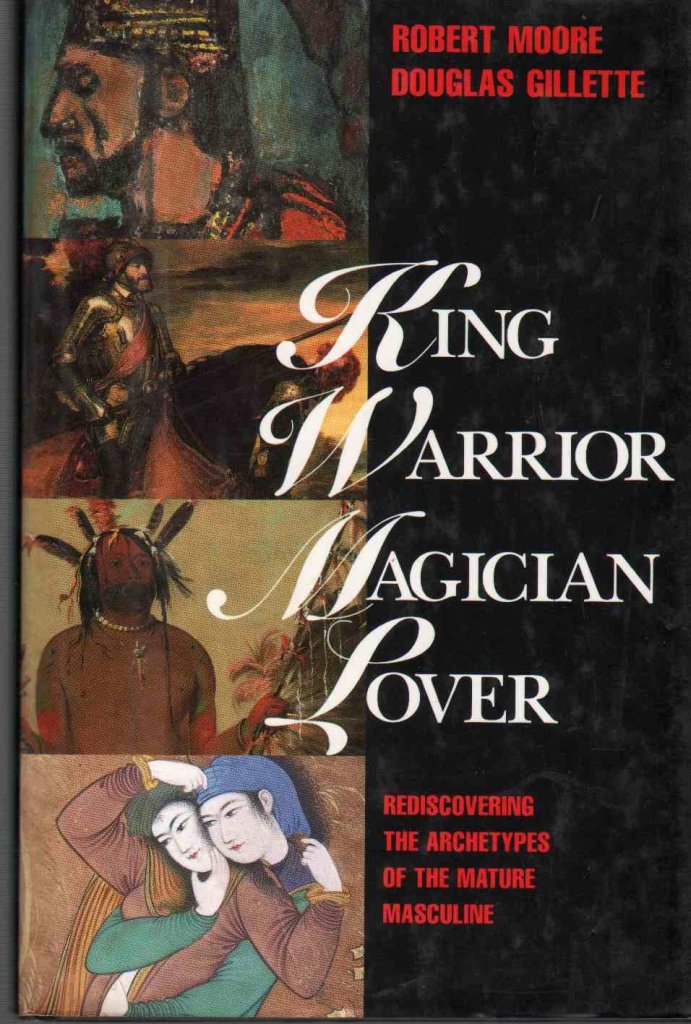
“We hear it said of some man that “he just can’t get himself together.” What this means, on a deep level, is that so-and-so is not experiencing, and cannot experience, his deep cohesive structures. He is fragmented; various parts of his personality are split off from each other and leading fairly independent and often chaotic lives. A man who “cannot get it together” is a man who has probably not had the opportunity to undergo ritual initiation into the deep structures of manhood. He remains a boy – not because he wants to, but because no one has shown him the way to transform his boy energies imo man energies. No one has led him into direct and healing experiences of the inner world of the masculine potentials.”
“The first step in doing this, for each of us, is critical self-appraisal. We have said that there is no use asking ourselves if the negative or shadow sides of the archetypes are showing up in our lives. The realistic, honest question we need to ask is how they are manifesting. Let us remember that the key to maturity, to moving from Boy psychology to Man psychology, is to become humble, to be grasped by humility. Humility is not humiliation. We’re not asking any man to submit himself to humiliation at his own or others’ hands. Far from it! But we all need to be humble. Let us recall that true humility consists of two things: the first is knowing our limitations. and the second is getting the help we need.”
~ The four archetypal quadrants of the masculine soul ~ the Leader, the Fighter, the Thinker, and the … Lover, respectively. We have them all inside us, it is just a matter of recognizing their place and balancing their presence. Every soul has its shadow; every King may become a tyrant. Awareness comes when you realize the distinction is that one is simply a lower form of consciousness – one that we can raise up and out of with sincere work within sacred spaces, alongside other men striving for the same.
Weaveworld (1987) — Clive Barker

Tales of Paradise Lost are central to our culture, of course; we are all exiles from some place of bliss. … It’s such a simple idea, but it still seems to me miraculous: that in words we may preserve ideas and images precious to us. Not only preserve them, but pass them on. To dream in isolation can be properly splendid to be sure; but to dream in company seems to me infinitely preferable.
And all because he’d seen something wonderful, and he knew in his bones that his life would never be the same again. How could it? He’d climbed the sky and looked down on the secret place that he’d been waiting since childhood to find.
The magic of the Seerkind could not survive long in such a world. And, stripped of their raptures, what were they? A lost people, with visions behind their eyes, and no power to make them true.
True joy is a profound remembering; and true grief the same.
That was the most important lesson Shadwell had learned as a salesman. If what you possessed was desired ardently enough by another person, then you as good as possessed that person too. Even princes could be owned.
He was a part of these people wasn’t he? Their tragedy was his tragedy; and their longing his too.
Most of her life she’d associated power with politics or money, but her secret self had learned better. Imagination was true power: it worked transformations wealth and influence never could.
“Might it not be cleaner …” the Angel said, its words measured, “… if we emptied the whole world of living things?”
Perhaps he had simply seen too much; and the surfeit had left him indifferent to being.
…Ahead, there were such sights unfolding: friends and places they’d feared gone forever coming to greet them, eager for shared rapture. There was time for all their miracles now. For ghosts and transformations; for passion and ambiguity; for noonday visions and midnight glory. Time in abundance. For nothing ever begins. And this story, having no beginning, will have no end.
~ A mythic journey into a forbidden world of wonder and horror. Beautifully written.
Wabi-Sabi: For Artists, Designers, Poets & Philosophers (1994) — Leonard Koren

The closer things get to nonexistence, the more exquisite and evocative they become.
Beauty is an altered state of consciousness.
~ On the art of wabi-sabi, a Japanese aesthetic centering around impermanence and ambiguity, about honoring and embracing the ephemeral of our existence.
Manufacturing Consent: The Political Economy of the Mass Media (1988) — Edward S. Herman, Noam Chomsky
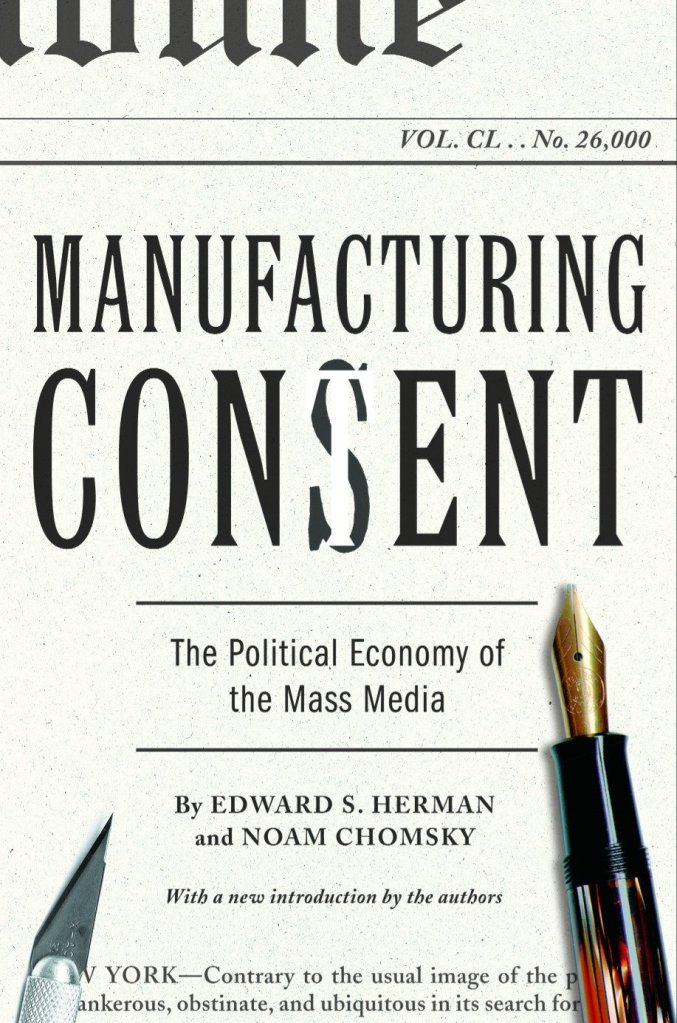
“They who have put out the people’s eyes, reproach them of their blindness.” ~ John Milton
THIS BOOK CENTERS IN WHAT WE CALL A “PROPAGANDA model,” an analytical framework that attempts to explain the performance of the U.S. media in terms of the basic institutional structures and relationships within which they operate. It is our view that, among their other functions, the media serve, and propagandize on behalf of, the powerful societal interests that control and finance them. The representatives of these interests have important agendas and principles that they want to advance, and they are well positioned to shape and constrain media policy. This is normally not accomplished by crude intervention, but by the selection of right-thinking personnel and by the editors’ and working journalists’ internalization of priorities and definitions of newsworthiness that conform to the institution’s policy.
Studies of news sources reveal that a significant proportion of news originates in public relations releases. There are, by one count, 20,000 more public relations agents working to doctor the news today than there are journalists writing it.
Advertisers don’t like the public sphere, where audiences are relatively small, upsetting controversy takes place, and the settings are not ideal for selling goods. Their preference for entertainment underlies the gradual erosion of the public sphere under systems of commercial media, well exemplified in the history of broadcasting in the United States over the past seventy-five years. But entertainment has the merit not only of being better suited to helping sell goods; it is an effective vehicle for hidden ideological messages. Furthermore, in a system of high and growing inequality, entertainment is the contemporary equivalent of the Roman “games of the circus” that diverts the public from politics and generates a political apathy that is helpful to preservation of the status quo.
In his book Golden Rule, political scientist Thomas Ferguson argues that where the major investors in political parties and elections agree on an issue, the parties will not compete on that issue, no matter how strongly the public might want an alternative. He contends that for ordinary voters to influence electoral choices they would have to have “strong channels that directly facilitate mass deliberation and expression.” These would include unions and other intermediate organizations that might, through their collective power, cause the interests of ordinary voters to be given greater weight in the political system. … The propaganda model, and the institutional arrangements that it reflects, suggests that the same forces that preclude competition among the parties on issues on which the major investors agree, will also dominate media choices and rule out “mass deliberation and expression” on those issues. For example, polls regularly indicate that, except in periods of war and intense war propaganda, the public wants a smaller defense budget and favors a spending shift from defense to education and other civil functions. But because the major investors agree that a large defense budget is desirable, the two dominant parties compete only on whether the one or the other is stinting on military expenditures, with both promising to enlarge it (as both George W. Bush and Al Gore did in the presidential election campaign of 2000). And the mainstream media do the same, limiting debate to the terms defined by the two parties and excluding deliberation and expression of the position that large cuts are desirable. The alternative presidential candidate, Ralph Nader, called for such cuts, but the media denied him a voice on the issues, some of them explicitly defending his exclusion from the presidential debates on the grounds that the options afforded by the two parties sufficed.
THE MASS MEDIA SERVE AS A SYSTEM FOR COMMUNICATING messages and symbols to the general populace. It is their function to amuse, entertain, and inform, and to inculcate individuals with the values, beliefs, and codes of behavior that will integrate them into the institutional structures of the larger society. In a world of concentrated wealth and major conflicts of class interest, to fulfil this role requires systematic propaganda.
The essential ingredients of our propaganda model, or set of news “filters,” fall under the following headings:
(1) the size, concentrated ownership, owner wealth, and profit orientation of the dominant mass-media firms;
(2) advertising as the primary income source of the mass media;
(3) the reliance of the media on information provided by government, business, and “experts” funded and approved by these primary sources and agents of power;
(4) “flak” as a means of disciplining the media;
and (5) “anticommunism” as a national religion and control mechanism.
These elements interact with and reinforce one another. The raw material of news must pass through successive filters, leaving only the cleansed residue fit to print. They fix the premises of discourse and interpretation, and the definition of what is newsworthy in the first place, and they explain the basis and operations of what amount to propaganda campaigns.
A PROPAGANDA SYSTEM WILL CONSISTENTLY PORTRAY PEOPLE abused in enemy states as worthy victims, whereas those treated with equal or greater severity by its own government or clients will be unworthy. … “Concentrate on the victims of enemy powers and forget about the victims of friends.”
Biskind concludes his review of the PBS series by stating: “The truth is that the war was a crime, not a tragedy. The tragedy is that this film lacks the conviction to say so.” The same may be said about the retrospective commentary generally. The war was a “tragic error,” but not “fundamentally wrong and immoral” (as the overwhelming majority of the American people continue to believe), and surely not criminal aggression—the judgment that would be reached at once on similar evidence if the responsible agent were not the United States, or an ally or client. Our point is not that the retrospectives fail to draw what seem to us, as to much of the population, the obvious conclusions; the more significant and instructive point is that principled objection to the war as “fundamentally wrong and immoral,” or as outright criminal aggression—a war crime—is inexpressible. It is not part of the spectrum of discussion. The background for such a principled critique cannot be developed in the media, and the conclusions cannot be drawn. It is not present even to be refuted. Rather, the idea is unthinkable. All of this again reveals with great clarity how foreign to the mobilized media is a conception of the media as a free system of information and discussion, independent of state authority and elite interests.
In sum, the mass media of the United States are effective and powerful ideological institutions that carry out a system-supportive propaganda function by reliance on market forces, internalized assumptions, and self-censorship, and without significant overt coercion. This propaganda system has become even more efficient in recent decades with the rise of the national television networks, greater mass-media concentration, right-wing pressures on public radio and television, and the growth in scope and sophistication of public relations and news management. … The organization and self-education of groups in the community and workplace, and their networking and activism, continue to be the fundamental elements in steps toward the democratization of our social life and any meaningful social change. Only to the extent that such developments succeed can we hope to see media that are free and independent.
~ On the American mass media enterprise and its model for subtle propaganda, censorship, and dogged defense of national and corporate interests. The goal of the media is to “manufacture consent” – to convince the populace, through the careful presentation or coverup of information, that what is happening is good and/or was the only option.
The Sublime Object of Ideology (1989) — Slavoj Žižek

Let us take the Freudian notion of the ‘death drive’. of course, we have to abstract Freud’s biologism: ‘death drive’ is not a biological fact but a notion indicating that the human psychic apparatus is subordinated to a blind automatism of repetition beyond pleasure-seeking, self-preservation, accordance between man and his milieu. Man is – Hegel dixit-‘an animal sick unto death’, an animal extorted by an insatiable parasite (reason, logos, language). In this perspective, the ‘death drive’, this dimension of radical negativity, cannot be reduced to an expression of alienated social conditions, it defines la condition humaine as such: there is no solution, no escape from it; the thing to do is not to ‘overcome’, to ‘abolish’ it, but to come to terms with it, to learn to recognize it in its terrifying dimension and then, on the basis of this fundamental recognition, to try to articulate a modus vivendi with it.
All ‘culture’ is in a way a reaction-formation, an attempt to limit, canalize – to cultivate this imbalance, this traumatic kernel, this radical antagonism through which man cuts his umbilical cord with nature, with animal homeostasis. It is not only that the aim is no longer to abolish this drive antagonism, but the aspiration to abolish it is precisely the source of totalitarian temptation: the greatest mass murders and holocausts have always been perpetrated in the name of man as harmonious being, of a New Man without antagonistic tension.
We have the same logic with ecology: man as such is ‘the wound of nature’, there is no return to the natural balance; to accord with his milieu, the only thing man can do is accept fully this cleft, this fissure, this structural rooting-out, and to try as far as possible to patch things up afterwards; all other solutions -the illusion of a possible return to nature, the idea of a total socialization of nature – are a direct path to totalitarianism. We have the same logic with feminism: ‘there is no sexual relationship’: that is, the relation between sexes is by definition ‘impossible’, antagonistic; there is no final solution, and the only basis for a somewhat bearable relation between the sexes is an acknowledgement of this basic antagonism, this basic impossibility.
…’absolute knowledge’ itself is nothing but a name for the acknowledgement of a certain radical loss.
The most elementary definition of ideology is probably the well-known phrase from Marx’s Capital: ‘sie wissen das nicht, aber sie tun es’ – ‘they do not know it, but they are doing it‘.
…through fantasy, we ‘learn how to desire.’ … Another Hegelian joke: What notion of the subject is compatible with this paradoxical character of the Real? The basic feature of the Lacanian subject is, of course, its alienation in the signifier: as soon as the subject is caught in the radically external signifying network he is mortified, dismembered, divided. To get an idea of what is meant by the Lacanian division of the subject, one has only to remember Lewis Carroll’s well-known paradox: ‘I’m so glad I don’t like asparagus: said the small girl to a sympathetic friend, ‘because, if I did, I should have to eat it – and I can’t bear it!’ Here we have the whole Lacanian problem of the reflexivity of desire: desire is always a desire of a desire. The question is not immediately ‘What should I desire?’ but ‘There are a lot of things that I desire, I have a lot of desires – which of them is worth being the object of my desire? Which desire should I desire?’
~ Dualistic kernel at the core of every Zizek idea and stanza of theory: When you *KNOW* that something is one way, it allows you to act as if it wasn’t that way. Knowing isn’t half the battle to changing our mind – knowing can, in fact, embed the status quo further. Everything with humans is a psychological double-bind. We, as conscious human beings, are constantly tricking ourselves. The layers of consciousness house multitudes of contradictions and abstract fears and desires, that we are barely aware of most of the time. We act and live with many of these layers on autopilot, operating without our knowledge (through the unconscious aspect of the psyche). They are shaping the way we think and what we do. And to the degree that we can become aware, that doesn’t mean we will be free of them – our unconscious desires and fears. It just means that a new layer has covered us over. Ideology works this way, and utilizes all of these reversals and contradictions and tricks to layer us deeper into its folds, for better or worse. Put another way, Being and Nothingness aren’t necessarily opposites. Inspected close enough, and Being is revealed to be part of Nothingness…
The Legend of Drizzt – Generations: Timeless (2018) — R.A. Salvatore
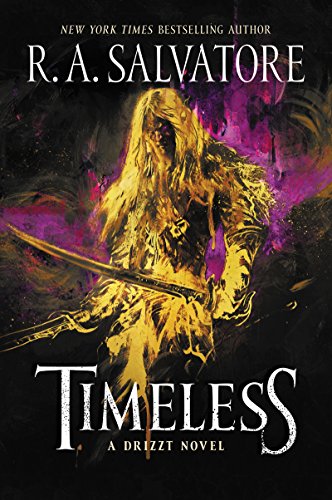
“Everything for a reason,” Eskavidne said. “A curious comment for a handmaiden of the Lady of Chaos,” Zhindia observed. “Chaos is the reason,” the handmaiden replied immediately.
The pair met a handful of times over the next month, mostly drinking and playing bar games and finding enjoyable diversions with lovely companions in the Oozing Myconid’s many smaller bedchambers. On one occasion, Zaknafein managed to join a brawl, and another night, Jarlaxle took him on a scouting expedition that very nearly got them caught within a private compound by the priestesses of a ruling house. Life had become a game for Zaknafein, as it was for him, Jarlaxle recognized, and so he was happy. The rogue eagerly anticipated each new encounter with the weapon master.
For the greatest teaching of the monks of the Yellow Rose is the ability to forgive, wholly, your own shortcomings, to accept your physical being as a vessel to a spirit ever seeking perfection. Such true acceptance of oneself, of limitations and weaknesses and failings, allows one to proceed without becoming hindered by guilt and undue hesitance. To hear the echoes of the past. To anticipate the notes of the future. To stride more boldly. And so, scimitars high, I go, boldly and with a smile .— Drizzt Do’Urden
“I grow tired of your games.” / “Then take a nap. In the meantime, remember this isn’t a game—I do a job, I get paid.”
The rich man is often owned by that which he thinks he owns. The rich woman might elicit jealousy, and while satisfying to her, her provocation will harden the visages of those around her long before she has died. Some people measure wealth in gold. Others measure it in tears of those who mourn them when they have passed on. … The more you have, the less you need, and once all the basic needs are met, the luxuries become redundant and indeed flatten the joy of purchase. … A beggar at the gates of House Baenre will be killed or enslaved. A beggar at the gates of Gauntlgrym will find a hot meal and a bed. This is why King Bruenor is my friend.
~ Drizzt is reunited with his father, Zaknafein. From ages past, his ideals were reborn in his son. Though their final meeting ended in tragedy, they get a second chance. Deeply ingrained xenophobia via trauma prevents Zak from fully accepting his son’s strange and wondrous life on the surface. And yet, progressions are made. Zak and Jarlaxle’s companionship in ages past was a delight to see build and play out.
The Way of the Superior Man: A Spiritual Guide to Mastering the Challenges of Women, Work, and Sexual Desire (2004) — David Deida

This newly evolving man is not a scared bully, posturing like some King Kong in charge of the universe. Nor is he a new age wimp, all spineless, smiley, and starry-eyed. He has embraced both his inner masculine and feminine, and he no longer holds onto either of them. He doesn’t need to be right all the time, nor does he need to be always safe, cooperative, and sharing, like an androgynous Mr. Nice Guy. He simply lives from his deepest core, fearlessly giving his gifts, feeling through the fleeting moment into the openness of existence, totally committed to magnifying love.
Stop Hoping for a Completion of Anything in Life ~ Most men make the error of thinking that one day it will be done. They think, “If I can work enough, then one day I could rest.” Or, “One day my woman will understand something and then she will stop complaining.” Or, “I’m only doing this now so that one day I can do what I really want with my life.” The masculine error is to think that eventually things will be different in some fundamental way. They won’t. It never ends. As long as life continues, the creative challenge is to tussle, play, and make love with the present moment while giving your unique gift. It’s never going to be over, so stop waiting for the good stuff. As of now, spend a minimum of one hour a day doing whatever you are waiting to do until your finances are more secure, or until the children have grown and left home, or until you have finished your obligations and you feel free to do what you really want to do. Don’t wait any longer. Don’t believe in the myth of “one day when everything will be different.” Do what you love to do, what you are waiting to do, what you’ve been born to do, now.
The most erotic moment for a woman is feeling that you are Shiva, the divine masculine: imperturbable, totally loving, fully present, and all-pervading. She cannot move you, because you already are what you are, with or without her. She cannot scare you away, because you already penetrate her in fearless love, pervading her heart and body. She cannot distract you, because your onepointed commitment to truth will not bend to her wiles. Feeling this hugeness of love and freedom in you, she can trust you, utterly, and surrender her testing in celebration of love. Until she wants to feel you as Shiva again. And then the testing will begin anew. In fact, it is precisely when you are most Shiva-like that she will most test you.
~ Spiritual and sexual philosophy x practice for the masculine being seeking to live alongside – and absolutely love – the feminine being to the fullest. The Divine Masculine is about conviction; knowing who you are and loving who you are will allow you to love your life – and your partner – to the fullest.
Utopia (1516) — Thomas More

They think no one should be regarded as an enemy who hasn’t done you any harm. Human nature constitutes a treaty in itself, and human beings are far more effectively United by kindness than by contracts, by feelings than by words.
Nobody owns anything, but everyone is rich — for what greater wealth can there be than cheerfulness, peace of mind, and freedom from anxiety?
…a problem that has always seemed to need money for its solution, would promptly disappear if money ceased to exist. Let me try to make this point clearer. Just think back to one of the years when the harvest was bad, and thousands of people died of starvation. Well, I bet if you’d inspected every rich man’s barn at the end of that lean period you’d have found enough corn to have saved all the lives that were lost through malnutrition and disease, and prevented anyone from suffering any ill effects whatever from the meanness of the weather and the soil. Everyone could so easily get enough to eat, if it weren’t for that blessed nuisance, money. There you have a brilliant invention which was designed to make food more readily available. Actually it’s the only that makes it unobtainable.
I’m sure that even the rich are well aware of all this, and realize how much better it would be to have everything one needed, than lots of things one didn’t need – to be evacuated altogether from the danger area, than to dig oneself in behind a barricade of enormous wealth. And i’ve no doubt that either self-interest, or the authority of our Saviour Christ – Who was far too wise not to know what was best for us, and far too kind to recommend anything else – would have led the whole world to adopt the Utopian system long ago, if it weren’t for that beastly root of all evils, pride. For pride’s criterion of prosperity is not what you’ve got yourself, but what other people haven’t got. Pride would refuse to set foot in paradise, if she thought there’d be no under-privileged classes there to gloat over and order about – nobody wose misery could serve as a foil to her own happiness, or whose poverty she could make harder to bear, by flaunting her own riches. Pride, like a hellish serpent gliding through human hearts – or, shall we say, like a sucking-fish that clings to the ship of state? – is always dragging us back, and obstructing our progress towards a better way of life.
But as this fault is too deeply ingrained in human nature to be easily eradicated, I’m glad that at least one country has managed to develop a system which I’d like to see universally adopted. The Utopian way of life provides not only the happiest basis for a civilized community, but also on which, in all human probability, will last forever.
~ More’s Utopia lays out a whole society, compassionate, strange, egalitarian, impossible(?), that values longevity more than ambition, and equality more than competition. It is an unrecognizable vision of a world without private property (Communistic), yet still deeply religious (ala Catholicism or naturalism), that wages war using assassins in order to limit commoner casualties, and turns its criminals into temporary slaves who are yet still a part of the overall community… A masterful work if only because of when it was written: 1512! I can only imagine how many other writers – or future theories, social organizations, and governments – this work directly or indirectly influenced.
Berserk ~ “The Fantasia arc” Volumes 35-41 — Kentaro Miura (1989-2021)
The sublime struggle of Guts ends, within a fantastical world where good and evil have been united by Femto-Griffith. The final chapter is transcendent.


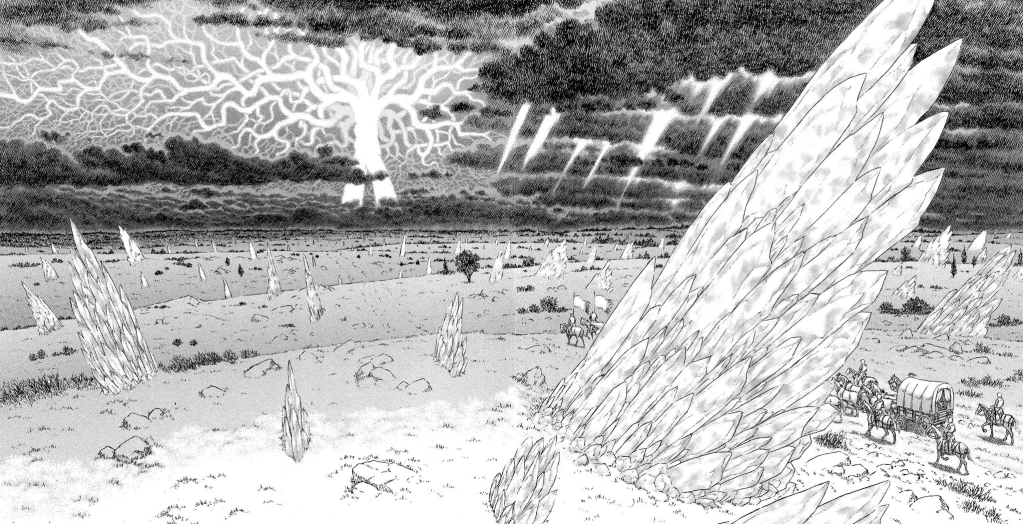

MUSIC
2021 albums:
- FLOWERS for VASES / descansos ~ Hayley Williams – 8/10
- Into The Storm ~ Gojira – 8/10
- star-crossed ~ Kacey Musgraves – 8/10
My Spotify 2021 Playlist: https://open.spotify.com/playlist/37i9dQZF1EUMDoJuT8yJsl?si=c57aba0c9c0c4cac